- Skip to main content
- Skip to primary sidebar

Writing Tips Oasis - A website dedicated to helping writers to write and publish books.

31 Military Fiction Writing Prompts
By Brittany Kuhn

Are you writing a military fiction novel? Do you need some ideas for your book? The following 31 military fiction writing prompts will help!
General Military Fiction Prompts
1. two recruits at a military academy have a rivalry..
Choose one of the recruits as your primary protagonist and show them battling with their rival from day one. There should be some big event or challenge towards the end of the story that brings the two together and teaches them that they are better together than apart.
2. A soldier’s plane is shot down on the wrong side of the battlefield.
This is a suspense story focused on whether the soldier will survive. Start with them crash landing and show how they fight and struggle to get back to their own side. End with them being rescued.
3. A submarine is hijacked while still in the water.
While patrolling during peacetime, a submarine crew is hijacked by fellow crew members whose aim is to start a war by blaming the destruction of the submarine on another country. The story should be how the rest of the crew work together to stop the dangerous hijackers to maintain peace.
4. A young recruit discovers a dangerous secret while training at the academy.
Make the secret whatever you want but make sure that it involves people at all levels of the military. The recruit is in danger just for the knowledge of this secret. Uncovering the secret would topple the academy itself, so the person must work secretly to discover and expose the details without knowing who to trust.
5. A military hostage and their captor become friends and work together to stop the war.
Start with the hostage being locked away and show the events that lead to their friendship. The hostage helps the captor realize the futility of the war and the second half of the story should be them working together to stop the war, or at least escape it together.
6. When there’s a murderer on a submarine, there’s nowhere to run!
Start the story with the murder and have the lead investigator on the submarine investigate it. End with the investigator ousting the murderer, either by death or by bringing them to justice on land.
7. The rise and fall of a secret government operation during wartime.
This could be as common as trying to create a ‘secret solider serum’ that backfires. Or you could write about something more paranormal, like telekinesis. In either case, show the beginnings of the program, the rationale for it, how it damages the soldiers, and end with it being discovered and abandoned.
8. A disillusioned military officer gets reassigned as a drill instructor for new recruits.
You should start with the event that gets them nearly dishonorably discharged and show them reluctantly take on this new post as a drill instructor. The story is about how learning from the younger crowd, being outside of the war machine, helps them grow as a person.
9. A group of battle buddies hear about a hidden treasure while in the middle of war.
Start with the lead friend roping the others into searching for the treasure. The story is about them working together as a military unit to find this treasure amidst the war happening around them.
10. A new soldier wants to see battle.
Begin with the soldier going through training and really buying into the hype of war. Follow them as they keep trying to go into battle (or for something to always stop it from happening). End with them finally getting their chance to do something heroic in battle but choosing instead to preserve life rather than take it.
11. A deployed military unit does everything in their power to get sent home.
This is more of a comedic story focused on all the antics the military members do so they can get sent home early. Start with them already deployed and deciding they want to go home early. End with them either getting sent home or realizing they really are where they need to be.
12. While deployed abroad, a chaplain struggles with their faith during a time of war.
The conflict of this story is about the purpose of war when the message should be peace. Start with an event that causes the chaplain to start questioning their faith. The rest of the story should be them engaging with other soldiers whose stories further question or prove the faith. The point should be that the chaplain realizes they’re there to help the unit not themselves, regardless of their faith.
13. An ex-soldier is hunted down by the very military they used to serve.
Have your soldier be completely isolated because of the traumas they endured in the war. Because of something they’ve seen or experienced, their home gets attacked and they must use all the military training they acquired to stop the attack.
14. A military unit is lost in the jungle and must find their way back.
During a routine operation, a military unit finds itself lost (or abandoned). The story is them fighting their way through wartime enemies and their own fears to find their way back home.

Historical Military Fiction Prompts
15. a soldier helps start what would become known as the world war i christmas soccer game..
Write a fictionalized account of how the famous soccer game happened during the Christmas Armistice of World War I. Make your protagonist the person who suggests the soccer game and describe how he felt in the battles leading up to the Christmas Armistice. What happened after that night? How were the soldiers changed by the sense of togetherness they felt in that one night?
16. Brothers in the American Civil War fight on opposite sides.
Start with them fighting over which side is ‘right’ and going off to war. Show how both brothers experienced many of the same hardships and personal struggles, regardless of who they were fighting for. You can end it with one brother choosing to support the other one, or you could have one brother die in conflict, maybe even fighting their own brother’s regiment.
17. A young spy aids the fight against Napoleon.
Write a fictionalized account of a French citizen who wants to stop Napoleon from taking over the world. This would probably work best if you chose a period early in the Napoleonic wars, before the Battle of Waterloo (his first loss and ultimately the start of his decline).
18. The Cold War is avoided when a brave soldier steps in.
Similarly, this could be about a soldier who stops an almost nuclear holocaust. Make the story about the soldier trying to convince his superiors to stand down from attacking the other side preemptively. End with the presidents nearly turning the key but deciding not to.
19. A small village decides to stand up to Genghis Khan’s military horde.
Imagine if a village within Genghis Khan’s Asian empire had chosen to stand up to him and his horde. Describe how they prepared to fight against him and whether they won.
20. The Battle for Cleopatra and her Egyptian empire.
This should focus less on Mark Antony and Cleopatra and more on the battle that led to their deaths. Show how Mark Antony fought his way across the Mediterranean to seek refuge with Cleopatra and end with their deaths.
21. Captains from the British navy and Spanish armada act out their rivalry in the Caribbean.
Choose whichever side you want as your ‘good’ side and start with them already in a rivalry. The story is about the many battles and run-ins they have over a period of a few months or a year. End with one side sinking the other’s ship once and for all.
22. A solider in the Nazi military decides to help Jewish prisoners during World War II.
Start with the Nazi soldier making friends with some of the prisoners he is supposed to police. Show how he helps train them to fight against the other soldiers and ultimately helps them escape.
Military Romance Prompts
23. a soldier must fight to save their love..
You can set this in a historical war or a general, unspecified one. What your story should focus on is how the soldier longs for their love during the war and does everything they can to get back to them safely.
24. Soldiers from opposite sides of a war fall in love.
How you bring the two soldiers together is up to you but have them fall in love quite early on. The story is then about how they are trying to overcome their opposing sides to be together.
25. A soldier and nurse find love amid all the death.
Start with the soldier getting injured and waking up in hospital. Have the first half of the story be about them falling in love with each other. The second half of the story is them trying to stay in love once the soldier has returned to war or they have returned home.
26. Two ex-soldiers discover love in their shared trauma.
Have two soldiers meet at a post-traumatic therapy group and bond over their experiences (or their lack of belief in the therapy). Over time, they learn to love each other. But when one gets called back up to fight, how will they deal?
Military Science Fiction Prompts
27. in the battle for earth, who will win.
This is an ‘alien invasion’ story with a focus on the military element. How would the planet coordinate their attacks? Which country’s military would you choose as the main protagonist? You can either start with the invasion or begin with it already in play, but be sure to end with a battle that decides Earth’s fate once and for all.
28. Discovering new planets isn’t always peaceful.
A spaceship lands on a new, uncharted planet and is suddenly, immediately attacked. The story is about who is in the ‘right’: the unsuspecting spaceship or the natives defending their home world.
29. When an advanced race from a distant galaxy suddenly appears, it takes a coalition of planets and their armies to take them down.
Start with the arrival of the advanced race. Focus the conflict on how the other planets learn to work together to stop this threat.
30. Can we stop cyborg soldiers in a futuristic war?
Two opposing sides have independently discovered successful cyborg technology. Your story is about the ‘good’ cyborg soldier trying to stop the ‘bad’ one from destroying society as we know it.
31. Simulations aren’t real, right?
Your story should be based around a recruit who uses simulation technology to learn wartime tactics. Eventually, though, they realize that the technology is less ‘simulation’ and more ‘real life scenarios’ with remotely guided machines. Will they carry on, knowing the damage they are doing is no longer just a game?

28 Writing Prompts About War
So you wanna write about war, but… war already feels written about, right?
Yeah, it’s a heavy topic with a long history .
From epic poems to gritty modern novels, war’s been dissected a million times over. But fear not, fellow wordsmiths! There’s always a fresh angle, a unique story waiting to be told.
This post is here to spark that fire. We’re diving into war-themed writing prompts right now.
Let’s check them out.
Writing Prompts About War
- In the throes of World War II, a soldier writes letters to his beloved. Fifty years later, a young woman stumbles upon these letters in an old trunk and feels an irresistible urge to respond, attempting to heal old wounds and bridge the chasm of time. What messages does she pen, and what mysteries unfold as she delves deeper into the soldier’s life and times?
- The physical damages of war are evident, but the emotional and psychological scars are often hidden. Your protagonist returns home from the warfront only to find that the war has followed him in haunting memories and triggering situations. How does he cope, and what strategies does he employ to help heal himself and his relationships ?
- Twin siblings are caught in the turbulence of a civil war. While one chooses to join the rebels, believing in their cause , the other remains loyal to the ruling government. How do their paths intersect throughout the conflict , and what choices do they make when they come face to face?
- Not all roles in the war are about fighting . A nurse in a military hospital faces the harrowing task of tending to the wounded, both allies and enemies alike. As she documents her experiences in a diary, she uncovers a secret about one of her patients. What revelations await her, and how do they reshape her understanding of the war?
- A pacifist is conscripted into a raging conflict. On the battlefield, he discovers not only the grim realities of war but also his own latent potential for leadership and strategy. In a world painted in shades of grey, how does he reconcile his personal beliefs with the brutal necessities of war?
- Amidst the din of war, a soldier hears a haunting melody being played from the enemy camp . Enchanted, he risks his life to meet the musician and learns about the stories and hopes that inspire such beautiful tunes amidst chaos. How does this shared love for music influence the choices they make in the midst of a brutal war?
- Children growing up in a war-torn city develop an intricate game that mirrors the strategies and battles they witness daily . Through their innocent eyes , the reader gets a fresh perspective on the complexities of warfare. How does this game affect their understanding of right and wrong, and what lessons do they offer to the adults around them?
- In a world recovering from a long and devastating war, a journalist is tasked with interviewing the last living veterans . As she collects their stories, she’s also grappling with the war’s impact on her own family ’s history. What truths does she uncover, and how do they shape her understanding of peace, loss, and memory?
- In a besieged city, a renowned violinist plays nightly from the remains of a shattered building. His music captivates both sides, eventually leading to a ceasefire during his performances. What power does this music hold, and can its notes forge a path to lasting peace amidst the war?
- Soldiers from opposing factions find themselves abandoned by their units in a vast, unknown terrain. To survive the harsh environment, they must rely on each other. As they journey together, how do their perceptions of the enemy change , and what bond, if any, emerges between them?
- A cartographer is tasked with mapping out territories in a rapidly shifting war zone. With each change in boundary, he realizes that his maps are inadvertently influencing the course of the war. Faced with the weight of his creations, does he remain neutral or try to change the tide of conflict?
- Amidst the despair of trench warfare, soldiers from both sides secretly exchange letters, sharing stories, hopes, and dreams . Their clandestine correspondence builds a bridge of understanding in the middle of chaos. How do these written exchanges affect their view of the enemy and the decisions they make in battle?
- An old, dusty journal surfaces in a second-hand bookstore, recounting tales of a mysterious soldier whose actions altered key events during the war. As a historian delves into the pages, they start to question previously held beliefs about the war. What truths lie hidden within the journal, and how do they challenge the established narrative ?
- A spy disguises themselves as an enemy officer to gather crucial intelligence. Living in daily peril, they form an unexpected connection with someone on the opposing side. How do they balance their duty to their homeland with the new relationships they’ve formed, and what sacrifices will they have to make?
- In a city reduced to rubble, a librarian strives to protect a secret collection of books that hold the cultural and historical legacy of their nation. As enemy forces close in, a choice must be made. Will the librarian save the irreplaceable collection or prioritize the lives of the city’s remaining inhabitants?
- Using newly developed technology , soldiers at the frontlines receive holographic messages from their families back home. While these messages offer a brief respite from the horrors of war, they also blur the lines between reality and longing. How do these glimpses of home shape a soldier’s resolve and their choices on the battlefield?
- In a world inundated with propaganda, a radio operator begins intercepting cryptic broadcasts from an unknown source. These messages offer a starkly different perspective on the ongoing war. As the operator deciphers these broadcasts, how does this newfound knowledge influence his role in the war and his loyalty to his nation?
- After a major battle, engineers from both warring factions are stranded in a no-man’s-land. They decide to cooperate and build a bridge to their respective sides. Through their collaborative effort, do they find common ground and perhaps a blueprint for peace?
- A renowned war medic, committed to saving lives regardless of allegiance, is captured and is forced to serve the enemy. With limited resources and facing dilemmas daily, how does the medic prioritize, and can healing serve as a catalyst for broader understanding?
- Years after the war, a curator designs an exhibit that showcases personal artifacts from soldiers, civilians, and others affected by the conflict. Each item tells a unique story. As visitors navigate the exhibit, how do these intimate glimpses into personal experiences reshape collective memories of the war?
- A soldier, unable to speak the local language , is separated from his unit and taken in by a rural family. Through gestures, shared tasks, and unexpected moments, they communicate . In the heart of enemy territory, can genuine human connection transcend the barriers of language and war?
- A submarine crew, cut off from the world due to a malfunctioning communication system, surfaces years after the war has ended. Unaware of the war’s outcome and the world’s current state, how does the crew navigate this unfamiliar reality, and what legacy do they carry from their time submerged?
- In an occupied city, unknown artists use graffiti to communicate messages of hope , resistance, and unity. Their artwork becomes a beacon for the oppressed. When the identity of the artists is threatened with exposure, what choices will the community make to protect their symbols of hope?
- In a region torn by conflict, a village decides to come together for their annual harvest festival, inviting even those from the opposing faction. The festival becomes a temporary truce, a momentary escape from the war’s realities. Can a shared cultural celebration sow the seeds of lasting reconciliation?
- An acclaimed painter is commissioned to create a portrait of a high-ranking general from the opposing army as a gesture of tentative peace. Throughout the sessions, the two share stories, philosophies, and regrets. As brush meets canvas, can art capture the essence of a man beyond his uniform, revealing the complexities of the human soul?
- A photojournalist embedded with a unit captures the raw and unfiltered moments of the war, focusing not on the battles, but on the quiet moments in-between – a shared meal, a tearful letter reading, a soldier’s introspection. With each snapshot, what untold stories emerge, offering a poignant commentary on the costs of war?
- During an excavation for a wartime bunker, soldiers uncover an ancient battleground filled with relics and writings from a forgotten civilization that once faced a similar conflict. Can lessons from a long-lost civilization influence contemporary strategies and potentially provide a roadmap to peace?
- A war-ravaged city operates a train that, legend says, leads to a sanctuary untouched by conflict. Desperate civilians and disillusioned soldiers alike seek passage. As they journey together, what stories unfold in each compartment, and does the train’s destination hold the promise they all yearn for?
Founder and Chief Content Curator @ Digital Phrases
I'm a writer, words are my superpower, and storytelling is my kryptonite.
Alternatively, search more than 1 million objects from IWM collections
How the Second World War inspired four writers
The Second World War was life changing for millions of people and it inspired some writers to create powerful novels that offer a new perspective on what it was like to live in such uncertain times.
IWM has selected four such novels from its extensive literary archive and is publishing them as the first in a new series, IWM Wartime Classics.
To launch the series, IWM staff searched for novels which covered wide-ranging fronts and experiences – from the Far East to Blitzed London, via Albania and the beaches of Normandy, the chosen books are moving and evocative accounts inspired by the real life experiences of each writer.
Learn more about the authors and their fascinating wartime experiences below.

During the Second World War, Alexander Baron served with the Pioneer Corps in Sicily, mainland Italy and France. It is this experience on which his first novel, From the City, From the Plough (1948) is based.
The novel authentically describes the long periods of training and waiting inherent in soldiering, as well as the realities of such groups of individuals sharing such close quarters. The title aims to evoke the men’s differing origins, with their urban and rural backgrounds and poignant descriptions of camaraderie and humour abound.
Yet the true dramatic focus of the book comes several chapters in, as the fictional battalion embarks for the beaches of Normandy.
The D-Day landings of 6 June 1944 play a huge role in the national memory of Britain, Canada and the United States. Due to the complex nature of such operations, the long planning and training – as described in the novel – was essential.
Alexander Baron was one of the men who crossed to France – his Pioneer company landed in one of the earliest waves, immediately after the first assault. Baron witnessed, though didn’t participate in, the fiercest fighting.
Later, he wrote, ‘in two of my novels there are accounts of the landing in Normandy on D-Day, June 6, 1944. These are based on my memories but I read them today as if they were somebody else’s story’. What his short, masterful novel conveys – in the way that feature films cannot – is this realism of the war experience. After all, Baron was there.
The novel doesn’t end with the D-Day landings, but goes on to describe the push into Northern France, with unflinching realism and an emotional impact that lives long in the mind of the reader.
Jungle warfare

Like Alexander Baron, David Piper saw active service and his novel Trial by Battle (1959) brilliantly conveys the claustrophobia and terror of the jungle fighting he experienced in Malaya during the Second World War. Piper served with the Indian Army, training as an officer in Bangalore before joining the 4th Battalion, 9th Jat Regiment. His battalion arrived in Malaya in January 1942.
As with From the City, From the Plough , the opening chapters of this novel set the scene for its young protagonist – a thinly disguised David Piper himself – as the author deals with some of the mundanities of Army life alongside some of its more light-hearted moments. But events soon take a different turn when the men arrive in Malaya.
From December 1941 to May 1942, the British Empire suffered the most humiliating series of defeats in its history, as Hong Kong, Malaya, Borneo, Singapore and Burma fell in rapid succession to the Imperial Japanese Army.
The Fall of Singapore in February 1942 was considered by the British Prime Minister, Winston Churchill, ‘the worst and largest capitulation in history’. The Japanese overran the numerically superior Commonwealth forces in Malaya in just over two months, resulting in more than 130,000 troops entering captivity.
Into this arena the young David Piper’s battalion was sent, and the book’s supreme strength lies in its depictions of jungle warfare once the men arrive. The evocation of the claustrophobia, the heat, the fear, and the tension can only be drawn from direct experience, and the novel’s dramatic denouement stays with the reader for a very long time.
After the surrender at Singapore, David Piper became a prisoner of war in Changi and then Taiwan. After the war, he returned to Britain and forged a successful career as an art historian and museum director.
Secret operations

Anthony Quayle was a successful British actor and theatre director, well known for his roles in classic plays on the stage as well as his film career. Perhaps less well known is Quayle’s war service, part of which is described vividly in his novel Eight Hours From England , originally published in 1945.
During the war Quayle served in the Royal Artillery, and in 1943 joined the Special Operations Executive (SOE). Quayle was deployed to Albania on 31st December that year, exactly the same date that the novel’s protagonist, John Overton is sent. Indeed, Quayle’s time in Albania is so closely reflected in Eight Hours from England that the book almost acts as a memoir, merely with the names slightly altered.
The book was one of the earliest accounts to be published by any ex-SOE officer, and it remains a powerful study of the dilemmas faced by occupied populations, and the challenges faced by outsiders inclined to help. Overton’s mission is muddied by competing local factions and tensions between the Allies themselves, not to mention geographical and logistical obstacles. The novel paints a fascinating portrait not just of derring-do and bravery, but also of some of the frustration of life as an SOE operative .
Quayle was in Albania for just over 3 months, but described his joy at leaving as ‘so great that it was almost pain. I jolted along in the back of the truck sobbing with happiness’.
Life in London

Kathleen Hewitt ’s novel of wartime London and the black market paints a vivid picture of the privations and strains of wartime. During the Second World War, Hewitt lived in a flat in Marylebone. She set her 1943 whodunit Plenty Under the Counter in the city she knew well.
The action takes place after the London Blitz – a period of 72 consecutive nights (excluding two nights of bad weather) where there were 354 attacks on London, with a corresponding casualty count of almost 20,000 civilians.
In this period, civilians were the front line and Londoners faced privation, disruption and loss of homes and loved ones.
The Blitz undoubtedly brought out the best in thousands of Londoners – the famous Blitz spirit – but it also had a darker undertone in the illicit black market. It is this which drives the plot in Hewitt’s novel – it is ultimately a detective story featuring murder and gangsters.
For a minority of Londoners, wartime, the black out and the Blitz presented opportunities to continue – or even begin – a life of crime. For many more people, the advent of so many new rules and regulations governing everyday life made it so much more tempting to cheat the system, and claw back some sense of pre-war normality.
Looting during the Blitz was a major problem, as was the black market – if you knew who to ask and could afford the prices charged. The biggest trade was in selling and buying coupons for petrol or clothing, but pretty much anything was available on the black market for a price, from fur coats to underwear. This is the world in which some of Hewitt’s characters become embroiled, and the world which the protagonist must attempt to navigate in order to solve the mystery.
In very different ways then, all four of these classic novels illuminate diverse aspects of the Second World War.
Order Wartime Classics from the IWM Shop

From the City, From the Plough
by Alexander Baron – A vivid and moving account of preparations for D-Day and the advance into Normandy.

Trial by Battle
by David Piper – A quietly shattering and searingly authentic depiction of the claustrophobia of jungle warfare in Malaya

Eight Hours from England
by Anthony Quayle – A candid account of SOE operations in occupied Europe from the renowned Shakespearean actor, director and film star.

Plenty Under the Counter
by Kathleen Hewitt – a murder mystery about opportunism and the black market set against the backdrop of London during the Blitz.
205 World War 2 Essay Topics & Examples
Looking for good World War 2 topics to explore? Look no further! In this list, we’ve collected the best topics of WW2 for middle school, high school, and college students. No matter what aspect you’re interested in, you will definitely find here something for yourself.
In addition to WWII topics, we’ve also included some helpful tips and essay examples. Check them out below!
🤫 Secrets of Powerful Essay on World War 2
- 🏆 Best WW2 Topic Ideas & Essay Examples
👍 Good Essay Topics on World War 2
- 🥇 Most Interesting WW2 Topics to Write about
🔎 Simple & Easy World War 2 Essay Topics
❓ ww2 essay questions, ✅ world war 2 research topics, ✍️ world war 2 topics for a project.
From diplomacy and espionage to battlefield events and the fate of nations, World War 2 essay topics are broad in range and require their writer to have an in-depth knowledge of various details.
Thus, writing a World War 2 essay may seem daunting due to the weight of the necessary historical analysis. However, writing an excellent paper is as easy as keeping in mind a few minor but cornerstone circumstances.
WWII Topics: Important Events
Everyone knows about the Atlantic and D-Day, but World War 2 essay prompts go further than the standardized level of knowledge. Paying due attention to the topic of the Eastern Soviet front, the French Vichy government, and the Blitz over Britain should be essential centerpieces of your essay.
All Ally members, just like all Axis partners, had their crucial moments and roles to play, and focusing on standalone countries does a disservice to a war that involved more than 30 countries.
Even if your central theme centers on a single country, you can gauge the independence of their politics and tactics per its allies. Remember that all events are interconnected and each action creates a reaction!
Creating a timeline, or finding one, will help you understand the continuity of the war’s narrative.
You should frame for yourself the time between events, the countries affected by them, and their outcome. Doing so, regardless of the problem you are tackling, will make your paper flow smoothly from one subject to another, touching upon interconnected ideas.
Topics of WW2: Prominent Personalities
When writing about World War 2, most essayists focus only on Adolf Hitler’s adverse role and outright criminal actions. However, you can and should go beyond even Franklin Delano Roosevelt, Joseph Stalin, and Winston Churchill.
Focus on the country that you are tackling; find what connections it had, and what tactics it pursued, and note its leader.
For example, if you are writing about the Eastern front, then mentioning the characters of Zhukov for war-related events, Molotov for diplomacy, and Kalinin for internal affairs will illustrate that you have a comprehensive knowledge of various interconnected topics.
Do your research keeping in mind the essentiality of the personal factor, even in worldwide affairs.
WW2 Topics: The Positive and Negative Consequences
Even today, there are demographic implications and political repercussions of the war. Thus, World War 2 essay questions should demonstrate all consequences of such an event, if possible with vivid examples.
Use quotations, studies, and book and journal titles to support the information you are presenting.
From the accounts of the event’s contemporaries to photo materials and recordings, there are millions of sources on the circumstances of World War 2, many of which are readily available online.
Let your bibliography be representative of your academism and include relevant, credible, and varied sources in it.
Paper Structure
Creating an outline for your paper in the pre-writing stages will help you overview the planned working process and see its weak aspects. Doing so includes seeing what themes are underdeveloped and which you have overpowered with information, as well as correcting this issue promptly.
Furthermore, doing so gives you an understanding of excellent World War 2 essay titles, which are pivotal in getting your readers interested in your work.
If you feel like your paper is lacking something, structurally or informatively, then you can read sample essays on similar issues and judge for yourself what you can apperceive from them.
Does your paper still feel daunting? Let IvyPanda give you some inspiration! Get motivated, writing, and graded “excellent”!
🏆 Best World War 2 Topic Ideas & Essay Examples
- Miscommunication Problems: the US and Japan in World War II At the beginning of 1945, the leaders of such countries as the United States, the United Kingdom, and China offered the document that outlined the conditions of the Japanese surrender under which Hirohito could stay […]
- The World War 2 Positive and Negative Repercussions The Effects Of The 2nd World War: The fall of world major powers: The war did not just end, but it had some positive and negative effect to the countries both involved and those that […]
- Could the US Prevent the Start of World War II? Some believe that the United States of America could prevent the outbreak of the war. Therefore, it is possible to assume that the USA could not have prevented the start of the Second World War […]
- World War 2 Consequences The major causes of this Great War were the unresolved issues that resulted from the World War 1. Another thing that led to the World War 2 was the failure of the League of Nations.
- World War II, Causes and Outcomes: Lesson Plan It includes the key concepts, objectives, materials, and the description of the activities that teachers can use to introduce new material to the students in the 11th and 12th grades.
- Propaganda During World War II The Second World War was a complicated time for both the general public and the authorities since while the former worried for their safety, family, and homeland, the latter needed to maintain the national spirit […]
- Shintoism and World War II in Japan The impact of religions on the world throughout history is undeniable, it can be seen how different religions include in their teachings all of the life aspects and affect them in a way or another.
- World War II Innovations Named as the Manhattan Project during World War II, the nuclear program of the Allies led to catastrophic consequences for the Axis forces, particularly in the context of the bombings on Hiroshima and Nagasaki, which […]
- Effects of the Pact of Steel Agreement on World War II He was a strong believer in the strength of the people as the backbone of the country and not the strength of the individual.
- How Cars Changed the United States After World War II The national rail network allowed the farmers to become part of the national economic recovery that started at the beginning of the Second World War and continued throughout 1960.
- Causes of World War II Therefore the desire by the Germans under Hitler to conquer other countries and the desire by the Japanese to expand their territory was the key cause of the war in Europe and subsequently the World […]
- Causes of WWI and WWII: Comparing and Contrasting In the following paper, Kenneth Waltz’s levels of analysis will be used for the comparison and contrast of causes of WWI and WWII. The second similarity refers to the distribution of power and the division […]
- The World War II Propaganda Techniques All the parties to the war, including Germany, the Soviet Union, and Britain, invested many resources in propaganda, but the present essay will focus on the United States’ effort. Furthermore, propaganda messages were created to […]
- Doing Academic World War II Research Researchers can use the information on the authors at Britannica to determine the reliability of the information provided on the website.
- The Art of Being Lonely: A Portrayal of the Lives of Chinese Women of the Post-WWII Generation. Wang Anyi’s “The Song of Everlasting Sorrow” Analysis Because of their being not ready for the shift from a WWII to the post-WWII environment and the change in values, Chinese women were highly susceptible and extremely vulnerable to the lures of the “New […]
- Women in World War II The involvement of women in the war was quite significant to the women as they were able to have a strong arguing point after the war and this made it possible for the women to […]
- Nationalism in World War II Another critical “nation-statehood making” is the break of the Soviet Union and the end of cold war between Soviet Union republic and the United States.
- The Role Played by Texans in World War II Involvement in the war was expected because the US was against Japan’s entry into Middle East, and colonization of Africa and certain regions of Europe by Germany and Italy. The US was greatly perturbed after […]
- World War II Propaganda Posters in America The imagery of the boot stepping on the American church is not just a threat to the religious ideals of the country but a threat to freedom itself as the church often doubled as the […]
- World War II Propaganda and Its Effects The purpose of this paper is to examine the confrontation between the German and the Soviet propaganda machines during the period of the Second Patriotic War, outline the goals and purposes of each, and identify […]
- Japanese Americans Internment During the WWII Besides, the treatise reviews the historical dynamics that allowed for the internment of Japanese Americans and the impacts of internment in the Japanese American communities during and after the end of WW II.
- The Neutrality of Vatican City During World War II Despite the moves made by the Pope Pius XII for the Vatican City to remain neutral in the World War II, the actions he made were seen as a great violation of stance.
- The Office of Strategic Services Operational Groups in World War II The study of the importance of O.S. To investigate the impact of O.S.
- World War 2 Leaders Comparison: Benito Mussolini and Adolf Hitler World War 2 remains one of the most significant and historically important events in the entire world because the United States of America, Japan, and the majority of European countries were involved in it.
- The Causes and Consequences of World War Two Some studies reported that the war caused around 62 to 80 million deaths, and this made it the deadliest fighting in the global history in terms of reported number of deaths compared with the world […]
- The Decolonization in Asia and Africa in the Post-WW2 Period According to Tignor et al, WW2 resulted in the following – the war itself left the unresolved issues of WW1 and heightened them, such as plans of Germany and Japan to expand their political impact […]
- Civilians as Victims of World War II The aim of this paper is to explore the suffering of civilians in the pursuit of victory in World War II.
- The Impacts of the Second World War on Asia The period after the Second World War saw the emergence and expansion of the world economies. Countries such as Japan and China started rebuilding their economies so as to compete with the rest of the […]
- Thinking Government: Conservatism, Liberalism and Socialism in Post World War II Canada This leads to the second implication which was summarized by political scientists in the following statement: “nothing can be guaranteed in life and that all individuals are also free to fail, to stumble to the […]
- The Significance of the Iron Curtain at World War II and the Cold War Churchill encouraged the US and the UK to unite and ensure that they ended the actions that the Soviet Union was exercising.
- The World War II: Impact and Consequences The Allies and the Axis were reluctant to follow any line that risked running into the antagonism of the other for fear of alienating their ally and therefore endangering one of the precepts of their […]
- V-2 Rocket and Its Impact on World War II and Today US Army The V-2 rocket was influential not only in the Second World War but also shaped the concept of the future of the US Army and is the prototype for many modern weapons.
- US Holocaust Policy During World War II However, the anti-Nazi campaign was not successful, and the main reason for this was the harsh foreign policy of the USA.
- Canada’s Role and Experiences in World War II The book emphasized the painful experiences the victims of the soldiers went through and the traumatizing memories they had. In the accompaniment of readers, the authors describe strategic bombing as a series of military activities, […]
- The Bonds or Bondage World War II Poster Analysis The current paper explores an example of a poster created in the early years of the war. During WWII, tax increases did not cover the military spending enough, and Henry Morgenthau, Jr, Secretary of the […]
- Important Questions on America Since World War II A significant part of Truman’s failures happened due to the inconsistency of his actions and his unwillingness to commit to social change.
- The US Foreign Policy in the Post-World War II Era In other words, rather than concentrating on maintaining peace in the region, the government deployed military troops to alleviate the domination of any power hostile to the US and its citizens.
- German Strategy During the Beginning of WWII The German’s use of the Nine Variables – Elements of Strategy aided them with great success at the beginning of the war from 1939 – 1941, and the failure to accurately access the Nine Constants […]
- World War II and the US Decision to Stay Out The United States was not involved in the war until 1941 since it had a Neutrality Act which established limits to the sale of weapons to fighting parties.
- The Role of Propaganda During World War II The poster encourages men to enroll in the army to protect the peaceful lives of women and children. By manipulating emotions and feelings, propaganda influenced people to enroll in the army or work harder.
- Researching of Turning Points in WWII The most discussed battles that possibly created or marked the momentum of the remaining part of the war are the battle of Midway, where the United States were able to gain advance, and the battles […]
- The Effectiveness of WWII Bombing Campaigns The German trial with two-engine fighters was a failure; the American one, on the other hand, was notably effective in the Pacific because of the broader range.
- Wartime Conferences of World War II The wartime conferences of World War II were genuinely significant in deciding the strategy undertaken by the Allies but also helped shape the world order during and in the aftermath of the world.
- D-Day: The Role in World War II By the end of 1944, Paris was released after the Allies approached the Seine River. D-Day became a significant event that influenced the pace of World War II.
- Promoting Production During World War II As the fighting continued, there arose the need to produce equipment to sustain the war: this came to be called wartime production.
- The World War II Discussion: The Convoy Tactics The last year of the war accounted for 60% of the total volume of military supplies that passed along the path of the polar convoys.
- South Africa During World War II Years Clark’s topic is the impact of World War II on the independence of South Africa. The main point of the author is that South Africa’s history during and immediately after World War II is underresearched.
- Contribution to World War II of Chinese and Native Americans Despite the dire conditions many of them lived in and white Americans’ discrimination against them, they used the war as the opportunity to prove themselves as loyal patriots.
- The Role of the United States in World War II The policy worked under the terms that the United States could sell arms provided that the buyer could pay in cash and seek their means of transportation.
- The Use of Radio in German Propaganda During the World War II One of the techniques used by the Nazis to persuade German people and shape their worldview was the use of such media as radio.
- Arguments Against the Use of Nuclear Weapons in World War II The firebombing campaign was against the use of atomic weapons in the form of nuclear bombs as it was aimed at urban centers and completely discriminatory.
- The European Theatre of Operations in WWII The Eastern front fought against the Western front, demonstrating various air and land campaigns. Battle of the Bulge.
- Soviet and American Perspectives on World War II Through Movies The theme is the same to show the rise and fall of the German Nazi empire. The first remarkable feature of the movie is the humor with which Mikhail Romm, the director of the movie, […]
- Pre-World War II South Africa: Centuries-Old Exploitation Afrikaners: from agriculture to “white-collar” work 1970s: 90 per cent of state top executive and managerial positions are taken by Afrikaners.
- Wikipedia: Posts About World War II There have been arguments voiced against the reliability of internet sources such as Wikipedia as a source of scholarly information. Wikipedia commands a huge following on the internet as a source of information.
- Winston Churchill, a Leader During the World War II He faced this disorder before the development of effective medication, and hence had to live with untreated Bipolar Mood Disorder throughout his life.
- Battle of Kursk: Germany’s Lost Victory in World War II Although the fighting efficiency of the Nazi troops decreased due to a decrease in the number of available equipment and the transfer of auxiliary units to the front, it was still a formidable force.
- Kurt Vonnegut. Wailing Shall Be in All Streets and Slaughterhouse-Five. Reflections on World War II The two literature pieces under consideration in the following paper can be acclaimed as a strong attack to the motives of those participating in the World War II along with the use of powerful irony.
- Comparing World War II to September 11th Both attacks were condemned on a global scale, and a huge fraction of the rest of the world rallied behind the US. Over 16 million soldiers were deployed to settle the score with the Japanese, […]
- Americanization in Germany Post WWII Most of these changes have indeed played a major role in improving the status of Germany only that the Germans now have little to be proud of in terms of heritage as most of it […]
- Women in Canada During World War II The analysis of the role of Canadian women in the most devastating war of the century presents special interest for us due to nontrivial results concerning the place of women in history that can be […]
- World War II and Germany’s Invasion Plans The invasion of Great Britain was important to Adolf Hitler because in this way the great air force power of Great Britain would have been destroyed.
- American Culture in the Post World War II Years Further still, the improvisation of Jazz music set a stage for new music culture in the American society that incorporated and appreciated the works of the black population.
- Women’s Role in World War II The significance of this event is not only due to the destruction and the great number of people that were killed in the said conflict but also the numerous precedents that help changed the course […]
- The Influence of the Second World War on the 20th and 21st Centuries’ Cinema The movie follows the lives of a German Wehrmacht infantry platoon as they are shuttled from the North African front to Italy and finally to the Russian front where they find themselves part of the […]
- Anti-Japanese Propaganda During World War II The content of propaganda was much the same as that of broadcast propaganda: emphasis on the Allies’ growing war potential, ridicule of the more preposterous assertions of the National Socialists, evidence of self-contradictions in the […]
- American Economic History After World War II In the beginning, it’s been the United States displacing Great Britain as the world’s largest economy and in the end it’s the globalization that made the biggest noise.
- WWII to 1965: Administration, Policies, Preeminence The legislation that created it aimed to unify and streamline the governance between the whole army while in turn maintaining the individuality of the various army units.
- Issue of World War II Regarding Comfort Women In 1991, the issues regarding comfort women exploded in the public when a woman from South Korea came out to the public and testify the issue regarding comfort women.
- Culture and Customs of Japan After WWII It must be admitted, however, in the interests of truth, that the traditional mode of living and ways of thinking, both good and bad, are deeply rooted in the life of the Japanese people of […]
- Impacts of the Pacific War and World War II in Japan Japan surged with the inversion trend undeterred, in 1937, it launched a large-scale inversion of China and four years later in 1941, it attacked the US, triggering the entry of America to the Second World […]
- Could the World War II Have Been Avoided? First of all, arguing on the matters of the inevitability of World War II it is necessary to point out, that the causes of it take the roots at the end of World War I, […]
- Shifting Images of Chinese Americans During World War II Therefore, it is important to elaborate on the history of relationships between Japanese Americans and Chinese Americans in the period between 1920 and 1940. Thus, the tendency for the distinguishing and distancing of the Chinese […]
- World War II and Its Impact on Asian Americans In general, most Asian Americans benefited from war as the Filipino, the Chinese, and Indians were wartime allies of the United States.
- Atomic Bomb as a Necessary Evil to End WWII Maddox argued that by releasing the deadly power of the A-bomb on Japanese soil, the Japanese people, and their leaders could visualize the utter senselessness of the war.
- The Marshall Plan’ Effects on Post WW2 Design To, some extent, the impacts of the Marshall on design can be explained by the economic situation in Europe at that time, and especially the necessity to reduce the costs of production.
- Deindustrialization After the World War II The battle for equality in different working environments led to the passage of the Fair Employment Practices Commission. The tightening labor market in the country also resulted in new employment patterns.
- World War II Facts in Wikipedia Article This article will use the information from the article written by Harris to evaluate Wikipedia’s article on World War II with the aim of establishing if the information from the site can be regarded as […]
🥇 Most Interesting World War 2 Topics to Write about
- World War II in “Slaughterhouse-Five“ Novel by Kurt Vonnegut To make a detailed description of the expressed opinion and to prove it, we should consider the characteristic features of the heroes and the general perception of novels which are directed at the description of […]
- Post-World War II and Modern Women in the US I would be used to the things that, according to Dubois and Dumenil, the society demanded of women at the time, and I would readily stay at home and take care of my children, husband, […]
- Racism in the United States: Before and After World War II The U.S.government went from supporting racism against African Americans in the New Deal era to fight against racism by the 1960s because of World War II.
- World War II: A Very Short Introduction The questions addressed in the book were not very often discussed previously, as the author states in the introduction; Weinberg examines Germany’s responsibility for World War II, the reasons behind the eventual victory of the […]
- Australian Workforce Changes After WWII It should be noted, however, that the Australian male breadwinner model is of particular concern, as in the early fifties the model was totally revaluated.
- Roosevelt’s New Deal and Joining World War II It led to the restructuring of the American economy and the establishment of the new model of relations between business, labor force, and the state.
- American Homefront During World War II The people who remained at home also had to change their lives to suit the war. On the same note, the people left at the homefront had to work together in order to survive.
- France Before World War I and After World War II To overcome the negative consequences of the Franco-Prussian War, France needed to focus on new perspectives for the state’s economic and political development, and such an approach could provide the state with the necessary resources […]
- Hitler’s and British Policies in World War II Britain was among the countries that did not welcome the idea of another war due to the bloodshed that had ensued in the World War I.
- Child Labor, Great Depression and World War II in Photographs The impression is of isolation and yearning for daylight, freedom, and a childhood foregone, in the midst of a machine-dominated world.
- American Women in World War II: Oral Interview In fact, the participation of women in the event was prepared during the First World War. Interviewee: Yes, I will give you any information that you may want because I was part of the historical […]
- Invasion of Normandy in World War II One of such legendary operations is the one that happened on D-Day, the day that shifted the balance of powers of the whole war, the put the beginning to the victorious march of the armies […]
- World War II in “Our Secret” by Susan Griffin The details she provides about various events and the manner in which she chooses her words clearly points out that this is not a work of fiction.
- World War II in Eurasia and America The war ended with the defeat of the far rights; however, conflicts of interests of the winners led to the tension that persisted for long years after the war.
- The Life of a Freedom Fighter in Post WWII Palestine As World War II was coming to an end, the Zionist Movement leaders were hopeful that the British government would amend the White Paper policy, allow the Jews to migrate to Eretz, Israel, and govern […]
- Dwight D. Eisenhower’s Role in World War II That is why historians and the public pay much attention to the discussion of the role in this war of those personalities who persistently led the Western anti-Hitler coalition to the victory over Nazi Germany […]
- WWII History: How Hitler Died From the onset of the war, Hitler proved to be a trustworthy leader. In the US, tests done on a part of the skull purported to be Hitler’s have given unconvincing results.
- Has Security Been the Main Driver Behind European Integration Since World War Two? Backed with the spirit of its member states and the United States, the Union has continuously executed its mandate and enlarged in order to advance and augment its efficacy in its operations.
- The Post World War II Nuclear Arms Race Costs The nuclear arms race led to a monumental increase in the military expenditure of the US and the Soviet Union.
- Peace and Normalisation Treaties Signed After World War II The treaty that was signed by Japan and Taiwan and the one between Japan and Korea had the same specificity. Treaties signed between Japan, Korea, Taiwan and People’s Republic of China each have unique characteristics […]
- WW II and Hitler’s Army After the massive defeat and deaths of the German army in the war that took place in the eastern side, it was evident that the traditional groups of the army were no longer working as […]
- “The Second World War: A Short History (Struggle for Survival)” by Robert Alexander Clarke The author traces the cause of the war from the Europeans and the Germans who were the key participants in the crisis.
- Was the American Use of the Atomic Bomb Against Japan in 1945 the Final Act of WW2 or the Signal That the Cold War Was About to Begin Therefore, to evaluate the reasons that guided the American government in their successful attempt at mass genocide of the residents of Hiroshima and Nagasaki, one must consider not only the political implications behind the actions […]
- Japanese Soldiers in the World War II Japanese recruits were forced to torture and maim their victims by their seniors to display their commitment and loyalty. Japanese soldiers thought they were highly respected by other Japanese civilians because of their willingness to […]
- United States – China Relations During World War II The war involved the greatest number of nations with all the major countries in the world playing a role in the war.
- Military Fascism in Pre-WWII Japan The military fascism was a way of expressing the Japanese economic, power and policy dissatisfaction by the west, and it hence contributed in some ways to the rise of World War II.
- Nazi Germany and Jewish Question The main theme of the entire speech made by SS in which we shall be analyzing in this section of the paper is about this group’s mission and strategies towards the implementation of orders handed […]
- The Influences of Neutral Countries in WW2 The validity of this suggestion can be illustrated, in regards to what historians know about the influences of the mentioned countries on WW2: Sweden Up until the year 1944, Sweden used to be in the […]
- Motivation in Combat: The German Soldier in World War II Omer Bartov’s Hitler’s army: Soldiers, Nazis, and war in the Third Reich represents a good example of such a literature, because in it, the author had made a point in trying to reveal the conceptual […]
- “The Blitzkrieg Myth: How Hitler and the Allies Misread The Strategic Realities of World War II” by John Mosier In order to present a clear picture of German participation in the war and the reasons, which provoked these people to fight and kill, it is necessary to concentrate on various sources and perspectives and […]
- Role of WWII in Shaping America’s History Boost to the Economy The entry of the United States into WWII was a major boost to the economy that was still reeling from the effects of the Great Depression of 1930.
- Dwight D. Eisenhower: World War II Hero and U.S. President In addition to his leading role as a peace and desegregation crusader, prior to his election as the 34th American president and even after his rise to the top seat, Eisenhower was a well known […]
- Controversies of World War II It is believed that Roosevelt wanted to engage Japan in war and the only way to achieve this was by allowing Japan to attack the Harbor.
- Western Women in World War Two The only means to win the war was to involve large population of women in employment since millions of men were at war and the rest of the male population was not enough to occupy […]
- Critical Analysis of “Walking Since Daybreak: A Story of Eastern Europe, World War II, and the Heart of Our Century” by Modris Eksteins The author presents a story of a people mixed with fear, anxiety and hope as the main characters of the book are caught in the traumatic experience of the war.
- Development Theories After Second World War Consequently, the rate of growth and development could be measured by the level of savings and investment in physical capital in the country. This theory has included changes in technology into the model of growth […]
- World War II History The consequences of the war had an impact on the political affairs of the world and resulted in a major change of the course of the history of the world.
- New Zealands Diplomatic Relations With China Since World War II The Interaction between China and New Zealand became formal in 1976, as a mechanism for curbing USSR influence.”This event was marked when Muldoon travelled to Peking in 1976 to meet Mao Zedong”.”It was plainly stated […]
- Historical and Geographical Dynamics That Had Shaped China by the End of World War II The end of the World War II was made possible by the initiation of the so-called development processes in the nations that had been involved in the rapid wars, i.e, the implementation of policies that […]
- The Arab States After the Second World War and the Six-Day War The paper will also discuss the events that led to the six-day war, the major events of the war, the outcome of the war and its contribution to the current political situation in the Middle […]
- World War II as the Most Devastating War in World History The devastation of the war was mainly due to the advanced military weapons used, from the infantry on the front line to the ships in the sea and the planes in the sky, these weapons […]
- World War II and Humanism Considering the problem of the effects of the World War II in the long term period it is also possible to find the remnants of the humanistic effect, if it was, or to come across […]
- The Second World War Unrest The Second World War was the greatest world unrest in the history of humanity. The war came at the time in which the global economy was recovering from a deep depression.
- European History During World War II This concept was crucial in the Second World War in Europe as there was a “large-scale mobilization of state resources for war to anticipate the modern concept of total war that was typically associated with […]
- The Major Powers of the Second World War After the First World War, the victors stated that they would do everything to preserve peace in the world. The countries that resisted Hitler’s ambition were referred to as the Allies of the Second World […]
- The Effects of the Second World War on US The war provided Americans with an opportunity to take control of the world and stamp authority in regions that belonged to other world powers.
- Analysis of Some US Documents in the Second World War The importance of this speech is in the statement of the reasons of the war, the development of the USA before its intrusion in the war and the betrayal of Japan which attacked the USA […]
- United States and the Second World War According to article 25-1, the attack on the Pearl Harbor was one of the reasons that forced the US to join the war.
- America in World War II – Experiences and Impacts During the World War II, aggression of Adolf Hitler and Nazi party led to persecution of Jews who lived in Germany.
- American History During World War Two The Nazi under the leadership of Hitler is ready to kill all the Jews as witnessed in the atrocities against them.
- Use of Arts in the Second World War by Nazi The films featured several themes such as the virtue of the Nordic or Aryan, the strength of the military and the German industry, and the evils of those who were perceived to be enemies.
- Second World War in U.S. History Studies on the Second World War have yielded varied perspectives; according to Erdelja, “there is no other experience that was more crucial to the development of the U.S.and Europe in the 20th century than the […]
- Race in World War II During the war and after the incarceration of the Japanese Americans, the American public was shown video footage and pictures that justified the confinement of Japanese Americans in the concentration camps.
- Pearl Harbor in the World War II Pearl Harbor is very significant in the history of the World War II because it is the place where the war started. This was another factor that contributed to the World War II, which began […]
- Political Causes of WWII for America and Germany This paper is an examination of the causes of involvement of America and Germany in the WWII. He is, in fact, said to be the person responsible for the start of the war.
- Challenges and Suggestions That British and American Government Faced After the Second World War In order to overcome these problems, the British politician insists on the necessity to singly out clearly the purposes, to grant simplicity of the decisions made, and declare the human rights and freedoms on the […]
- Foreign Policy: What Has Been the Main Emphases of America’s Foreign Policy From World War 2 to the Present Day? The main emphases of the foreign policy of the United States from World War 2 to the present day have been the containment of the Soviet Union and its allies, military domination, expansion of economy, […]
- Baby Boomers After World War II The government is campaigning for extension of retirement age, as this would boost the capacity of the social security trust fund to pay retirees.
- The Bombing of Dresden in World War II The first planes from the Royal Air force started the journey from 1,100 kilometers away and they were tasked with the role of identifying Dresden and releasing Magnesium flares to light up the areas that […]
- Developing Economy in Russian Federation After World War II Despite the presence of the war, Russia was able to sustain production in parts that were not affected by the war and this trend continued even after the war.
- Japanese Internment in the US During World War II The Japanese moved fast to occupy the territories previously in the hands of the US, and the more than 110,000 people of Japanese ancestry in the west coast raised issues for the president’s cabinet.
- War Crimes During the World War II It is clear that the holocaust was a war crime by the fact that, these were innocent civilians who were targeted specifically because of the hatred that Hitler had for them.
- Sexual Slavery and Prostitution During WWII and US Occupation in Japan He is the sole author of five titles, all of which are related to wars of the past and crimes against persons committed during the time.
- Was the Second World War Necessary?
- Why Did the British Government Decide to Evacuate Children From Britain’s Major Cities in the Early Years of the Second World War?
- Was London Prepared for the Outbreak of the Second World War?
- What Role Technology Played in the Second World War?
- How Far Did the Aims of Nazi Propaganda Change During the Course of WW2?
- Was the Second World War Inevitable and What Caused the Second World War?
- How the Relationship Between Australia and Japan Changed After WW2?
- Why Did the United States Fail the Second World War?
- Was Hitler Primarily Responsible for the Outbreak of the Second World War?
- How Did the Treaty of Versailles Help Contribute to the Start of WW2?
- How the Great Depression Ended by United States Entry Into the Second World War?
- How Did WW2 Affect American Society?
- How Did Germany Lose WW2?
- How Did WW2 Start?
- Was the Holocaust Planned During the Second World War?
- What Were the Cold War Fears of the American People After the Second World War?
- How Responsible Was Hitler for the Outbreak of WW2?
- Why Did Germany Lose WW2?
- How Did the Second World War Affect America?
- Why Did Germany Lose the Second World War?
- Was the Second World War a Consequence of Appeasement as an Aggressive German Foreign Policy?
- How Did WW2 Impact Canada?
- Were Japan and Germany Treated Differently by the United States During the Second World War?
- Was the Cold War in Europe the Direct and Logical Outcome of the Second World War?
- Which Factor Was the Most Important in Causing the End of the Second World War?
- How the United States Got Involved in WW2?
- How Did the First World War Set the Global Stage for the Second World War?
- How Did the Second World War Affect Family Life in Britain?
- How Did the Roles of Women Change During WW2?
- Women’s Contributions to World War II
- Battles and Strategies in the War against Japan
- The Complex Factors That Triggered World War 2
- How Technology Impacted Warfare and Military Strategies in WWII
- The Holocaust and Its Horrific Consequences
- How the Battle of Stalingrad Became the Turning Point of WW2 on the Eastern Front
- The Atomic Bomb and Its Impact on the Second World War
- The Nuremberg Trials and the Post-War Pursuit of Justice for War Crimes
- The Role of Propaganda in Shaping Public Opinion During WW2
- The Home Front and Civilian Experience During World War II
- Resistance Movements and Underground Networks during World War II
- The Global Economic Consequences of World War II
- The Strategies of Allied Commanders
- The African-American Experience in World War 2
- Espionage and Intelligence in World War 2
- The Scientific Legacy of Technology Transfer During WW2
- World War II and the Birth of the United Nations
- How Did Civilians Survive the German Air Raids?
- Post-War Reconstruction of Europe and Japan
- The Impact of World War 2 on Art and Popular Culture
- Civil War Titles
- Afghanistan War Essay Topics
- Cold War Topics
- Iraq War Research Ideas
- Vietnam War Paper Topics
- Rwandan Genocide Research Ideas
- Torture Essay Ideas
- Chicago (A-D)
- Chicago (N-B)
IvyPanda. (2024, March 1). 205 World War 2 Essay Topics & Examples. https://ivypanda.com/essays/topic/world-war-2-essay-examples/
"205 World War 2 Essay Topics & Examples." IvyPanda , 1 Mar. 2024, ivypanda.com/essays/topic/world-war-2-essay-examples/.
IvyPanda . (2024) '205 World War 2 Essay Topics & Examples'. 1 March.
IvyPanda . 2024. "205 World War 2 Essay Topics & Examples." March 1, 2024. https://ivypanda.com/essays/topic/world-war-2-essay-examples/.
1. IvyPanda . "205 World War 2 Essay Topics & Examples." March 1, 2024. https://ivypanda.com/essays/topic/world-war-2-essay-examples/.
Bibliography
IvyPanda . "205 World War 2 Essay Topics & Examples." March 1, 2024. https://ivypanda.com/essays/topic/world-war-2-essay-examples/.

Presentations made painless
- Get Premium
109 World War 2 Essay Topic Ideas & Examples
Inside This Article
World War 2 was one of the most significant events in modern history, shaping the world as we know it today. From the rise of totalitarian regimes to the devastation of entire cities, the war had a profound impact on millions of people around the globe. If you are tasked with writing an essay on World War 2, you may be overwhelmed by the sheer amount of information and topics to choose from. To help you get started, here are 109 World War 2 essay topic ideas and examples to inspire your writing:
- The causes of World War 2
- The key players in World War 2
- The role of propaganda in World War 2
- The impact of technology on World War 2
- The role of women in World War 2
- The Holocaust and its aftermath
- The Battle of Stalingrad
- The D-Day invasion
- The Pacific War
- The Manhattan Project and the atomic bomb
- The Nuremberg Trials
- The role of the United Nations in post-war reconstruction
- The legacy of World War 2 in modern politics
- The impact of World War 2 on the economy
- The resistance movements in occupied Europe
- The role of Winston Churchill in World War 2
- The role of Franklin D. Roosevelt in World War 2
- The role of Joseph Stalin in World War 2
- The role of Adolf Hitler in World War 2
- The role of Benito Mussolini in World War 2
- The role of Hirohito in World War 2
- The role of General Eisenhower in World War 2
- The role of General Patton in World War 2
- The role of General MacArthur in World War 2
- The role of General Montgomery in World War 2
- The role of General Rommel in World War 2
- The role of General Zhukov in World War 2
- The role of General Yamamoto in World War 2
- The role of General Tojo in World War 2
- The role of General Nimitz in World War 2
- The role of General De Gaulle in World War 2
- The role of General Tito in World War 2
- The role of General Chiang Kai-shek in World War 2
- The role of General Hirohito in World War 2
These are just a few examples of the many topics you could explore in a World War 2 essay. Whether you choose to focus on a specific battle, individual, or aspect of the war, there is no shortage of material to draw from. Remember to conduct thorough research, cite your sources, and present your arguments clearly and convincingly. Good luck with your essay!
Want to create a presentation now?
Instantly Create A Deck
Let PitchGrade do this for me
Hassle Free
We will create your text and designs for you. Sit back and relax while we do the work.
Explore More Content
- Privacy Policy
- Terms of Service
© 2023 Pitchgrade
We use cookies to enhance our website for you. Proceed if you agree to this policy or learn more about it.
- Essay Database >
- Essays Samples >
- Essay Types >
- Creative Writing Example
World War 2 Creative Writings Samples For Students
13 samples of this type
While studying in college, you will certainly need to compose a lot of Creative Writings on World War 2. Lucky you if linking words together and transforming them into meaningful text comes naturally to you; if it's not the case, you can save the day by finding an already written World War 2 Creative Writing example and using it as a template to follow.
This is when you will definitely find WowEssays' free samples collection extremely helpful as it contains numerous professionally written works on most various World War 2 Creative Writings topics. Ideally, you should be able to find a piece that meets your requirements and use it as a template to build your own Creative Writing. Alternatively, our skilled essay writers can deliver you a unique World War 2 Creative Writing model crafted from scratch according to your custom instructions.
Creative Writing On Agamemnon 3.0
Literature:, free creative writing on women during world war ii, women during world war ii, good creative writing on kenya economics analysis.
Don't waste your time searching for a sample.
Get your creative writing done by professional writers!
Just from $10/page
Historical Country Analysis: 1920s French Empire Creative Writing Example
The second world war and labor in the united states: free sample creative writing to follow, example of creative writing on sinclair maclaroy adams’ time away from appleby college, terrorism creative writing, sample creative writing on understanding terrorism, romantic comedy films syllabus creative writing, description, free fantasy and childrens/adolescents needs creative writing example.
C. S. Lewis’ “The Lion, the Witch, and the Wardrobe”
Good Example Of Creative Writing On While Discussing The Underlying Topic Some Of The Question That Arises Includes
Introduction, free creative writing on charisma, example of creative writing on harry potter - monsters and difference.
Password recovery email has been sent to [email protected]
Use your new password to log in
You are not register!
By clicking Register, you agree to our Terms of Service and that you have read our Privacy Policy .
Now you can download documents directly to your device!
Check your email! An email with your password has already been sent to you! Now you can download documents directly to your device.
or Use the QR code to Save this Paper to Your Phone
The sample is NOT original!
Short on a deadline?
Don't waste time. Get help with 11% off using code - GETWOWED
No, thanks! I'm fine with missing my deadline

Creative Writing Prompts Inspired by Historical Events
by Melissa Donovan | Oct 24, 2023 | Creative Writing Prompts | 12 comments

Creative writing prompts inspired by historical events.
Today’s prompts include selections from the book 1200 Creative Writing Prompts . Enjoy!
Nonfiction writers are obviously inspired by the real world, but fiction writers and poets also take inspiration from real people and events.
Wars, scandals, scientific advances, and famous figures in history have all been represented in every form of writing.
Works of fiction that resonate best with readers contain a kind of truth, a reflection of our own real experiences. That’s why looking to the events of history for story ideas is a great way to inspire a writing session. And of course, poetry takes inspiration from everything in the universe. While personal experiences may be more popular sources of inspiration, some incredible poems and stories have been triggered by real events throughout history.
Writing Prompts
You can use these creative writing prompts to write anything you want — a poem, a short story, a blog post, or a journal entry. The idea is to find the prompt that speaks to you and then start writing.
- In a country that rants and raves about freedom, the government decides that its people should not be allowed to drink liquor. Write a story set during Prohibition in the United States.
- The Great Depression filled the space between America’s Prohibition (which was still in effect during the Depression) and World War II. The Depression affected the entire world. Well-to-do people lost everything and found themselves standing in food lines. Ordinary people went to extraordinary measures to get a meager meal. Meanwhile, someone, somewhere profited.
- World War II gave rise to what journalist Tom Brokaw called “the greatest generation.” Create a cast of compelling characters and write a story showing how circumstances forced them to become great.
- The entertainment industry boomed in the twentieth century. Technology changed entertainment from an attraction you paid to see in a theater or other public setting to something you could enjoy from the comfort of your home. Every home had a radio. Black-and-white silent films evolved into Technicolor talkies. Now we have the Internet. Write a story centered on entertainment technologies of the past.
- Spaceships, planes, and men on the moon: We started out traveling around on foot. Then some clever Neanderthal invented the wheel. Now, we soar through the skies and tear through space. Write a story about a long journey set in an era when planes, trains, and automobiles weren’t readily available.
- The 1960s gave us Civil Rights, Woodstock, and the space race. What happens when a nation’s people are divided? What happens when minorities of people are oppressed? What happens when ordinary kids decide they don’t want to grow up and become just like their parents? Mix in the fact that there’s a war nobody understands and most people don’t believe in. Add drugs, flowers, and peace signs, and you’ve got the sixties. Write a story set during this iconic decade.
- Write a story that is set around the assassination of an important, benevolent, historical figure: for example, Gandhi, Martin Luther King, JFK, or John Lennon.
- Revolution could be defined as a war between a state and its people. Revolution often occurs when people are oppressed to the point of mass suffering. Choose one such revolution from history and write a story about the people who launched it.
- Throughout history, people have emigrated across land and ocean. Choose a time period of heavy human migration. Then choose a starting place and a destination and write the story of a character or group of characters who take the voyage. Focus on the journey, not the place of origin or the destination.
- The 1950s are often painted as a simple and idealistic time in American history. One income could support an entire family. Jobs were plentiful. Moms stayed home with their kids. Divorce was scandalous. Write about a protagonist who didn’t fit the mold, whose life was difficult because of the cultural and societal conventions of the time.
Good luck with these creative writing prompts! Have fun and don’t forget to come back and tell us how they worked for you.
Got any writing prompts of your own to share or add to this list? Leave a comment.
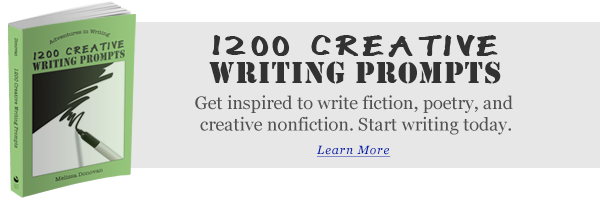
12 Comments
Great ideas for prompts. I’ll be stealing these for my Creative Writing class. Here’s one I came up with for a poetry class I’m teaching this summer. Feel free to try it and give it a more thorough explanation here, if you like it. essentially, the writer goes through his or her twitter feed or Facebook status updates and writes a list of the interesting verbs and nouns, then puts them together in interesting ways to form found poetry or story ideas. Here’s the list I came up with:
http://unapologetic-conjecture.blogspot.com/2011/06/fun-with-words-from-twitter.html
Hi Benjamin. I like the idea of getting word lists from Twitter and using them to prompt a writing session. Thanks for sharing!
Almost every time when I read scientific news I get ideas for my book set in far future. Or when I look at space pictures from Hubble. Sometimes I simply can’t enjoy reading the articles itself – ideas, ideas are coming! 🙂
I know the feeling! I was researching outer space just this weekend. Sometimes, I get so many ideas, it takes me a few days to work out which ones I should use!
I found this very interesting. Woodstock caught my eye because although I was not there the music is from my generation. My mind is overflowing with possibilities………….
Ooh, cool. Woodstock was before my time, but I’m fascinated by the Woodstock culture. There are definitely stories to be told there! Good luck with yours!
And isn’t it convenient that history just repeats itself? 😉
I suppose it could include events in one’s own life? Pretty potent events inspired my entry into fiction.
Of course. Some of the best inspiration comes from real-life experiences.
Speaking of cultural movements, does it seem to anyone else that America has entered a sort of post-Romantic era?
This is from Britannica : “Introspection was inevitable in the literature of an immediately Post-Romantic period, and the age itself was as prone to self-analysis as were its individual authors.”
I don’t think I’d use that description to describe what is happening in America right now. I would call this a divisive era. Dark, dystopian works seem to be popular juxtaposed against commercial art that could be construed as shallow or meaningless ( Hunger Games v. Fifty Shades ). In fact, one might say that there is a struggle between materialism and meaning. We could also call it the post-technology age, where we are challenged to adjust to a new system in which we rely heavily on technology and it has cost lots of jobs.
What a great question, Jesse. It’s given me much to think about. I do believe we are on the cusp of some new era. We live in fascinating times!
Great ideas. Many thanks. I’m filing this.
Submit a Comment Cancel reply
Your email address will not be published. Required fields are marked *
This site uses Akismet to reduce spam. Learn how your comment data is processed .

Subscribe and get The Writer’s Creed graphic e-booklet, plus a weekly digest with the latest articles on writing, as well as special offers and exclusive content.

Recent Posts
- Homophones for Music Lovers: Turn up the Bass and Play a Chord
- Are You Concerned About Originality in Your Writing?
- Should You Write Fast or Write Well?
- Writing Tips: Kill Your Darlings
- Writing Resources: A Poetry Handbook
Write on, shine on!
Pin It on Pinterest

- Hours - Tours - Parking
- Reading Room
- Exhibitions
- Visit from Home
- Gift Shop ➚
- Search the Collections
- Digital Collections ➚
- Early Books & Manuscripts
- Performing Arts
- Photography
- UT Campus Conservation Initiative
- Collection Development
- Access Policies, Rights & Reproductions
- Your Research Account
- Fellowships
- Classroom Experiences
- Educational Resources
- Internships
- Programs & Symposia
- Group Tours
- Make a Gift
- Become a Member
- Subscribe to eNews
- 65th Anniversary Gala
- Magazine ➚
The Ransom Center will be closed on Thursday, July 4.

PEN Teaching Guides
The PEN Teaching Guides contain materials for the use of instructors to support teaching on human rights, politics, literature, and cultural history. These materials include manuscripts, drafts, clippings, correspondence, official publications, books, posters, video recordings, and additional items from the PEN Digital Collections and related collections held at the Harry Ransom Center.
These guides are designed to allow students to engage not only with evolving conversations surrounding human rights and free speech in the twentieth century, but also with landmark events and broad historical trends, from the rise of fascism in the interwar years, through the intensification of the Cold War, and into the era following the collapse of the Eastern Bloc in the late 1980s and 1990s.
For further information on teaching or scheduling classes in the Harry Ransom Center, visit Classroom Experiences .
Produced with support from National Endowment for the Humanities.
These teaching guides were written by Reid Echols and Adrienne Sockwell with help from Jennifer Follen, Sarah Gutberlet, Christopher Mendez, and Chido Muchemwa.
Writing World War II
In an international war, military repercussions and the consequences of violence are inevitable. But world war takes a toll in many other ways, affecting not only military and strategic targets, but also cultural and creative leaders, thought leaders, artists, and ordinary citizens. As a relatively new international human rights organization, less than 20 years old by this time, and struggling against its charter to remain apolitical, PEN tried to intervene in a cultural struggle which grew as deadly as some military actions. From 1939 to 1945 as the war raged, PEN worked to secure asylum, to intervene on behalf of writers, to provide supplies and eventually to participate in government sponsored efforts to fight fascism and totalitarianism. As PEN tried to help writers across the globe, the organization was sometimes constrained by the legacies of imperialism that helped to create it.

Letter from Isaac Lamdan of the Hebrew PEN Club in Palestine to the 11th International Congress of PEN Clubs, Dubrovnik, Yugoslavia. May 19, 1933.
PEN Records 78.8

Draft of letter from Hermon Ould to Joseph Goebbels regarding the imprisonment of Ludwig Renn. January 31, 1934.
PEN Records 20.1

Letter from Ernst Toller and three other German writers addressed to the PEN International Secretary and Executive Committee. December 15, 1933.
PEN Records 70.1

English PEN Executive Committee Minutes segment "PEN and the Crisis." September 28, 1938.
PEN Records 235.6

Letter from Hermon Ould to Audrey Mildmay Christie. October 19, 1938.
PEN Records 10.5

Two poems by Haitian writer and activist Jacques Roumain. 1935.
PEN Records 77.2

List of PEN Centres in British Isles and Abroad. September 1944.
PEN Records 77.1

List of Centres of the International PEN. May 1945.

Speech delivered by Polish writer Kazimierz Wierzyński at the American PEN Center meeting. November 15, 1944.

Speech delivered by American writer Robert Sherwood at the American PEN Center meeting. November 15, 1944.
PEN and the Turn to Politics
Throughout the war, PEN responded using the traditional methods of protest via correspondence and activism through speeches and public comments. But some members aligned themselves with organized government efforts to fight the cause. Some efforts, such as the Writers' War Board, actively engaged in the war by producing material in the form of scripts for productions to be screened in schools and colleges. Their goal, overtly stated in their first report, was to "create a liaison between writers and government agencies to obtain written work that will directly or indirectly help to win the war." Some writers heartily engaged in these efforts. But others were more reluctant, and believed that some of the writer-produced items of war propaganda were not sufficiently anti-Nazi. They feared they would be judged over time for half-hearted or politically insufficient efforts. PEN joined the effort of many writers and artists who tried to find a way to link their work and access to a public platform to the war effort.

Speech delivered by English author W. Somerset Maugham at the American PEN Center meeting. November 15, 1944.

Production budget summary for war bond short film titled Nurse's Aide Short #2 by Vanguard Films, Inc. October 4, 1944.
David O. Selznick Collection 3716

Inter-Office Communication from E. L. Scanlon to David O. Selznick regarding U.S. War Savings Bonds. July 3, 1942.
David O. Selznick Collection 329

Cover of exhibit catalog Norman Bel Geddes: War Maneuver Models Created for Life Magazine by the Museum of Modern Art . 1944.
Norman Bel Geddes Theater and Industrial Design Papers Box 35, Folder 499.4

Homemaker's War Guide poster distributed by the U.S. Office of War Information. 1942.
War Posters Art Collection Call No. 85.170.96

Letter from Henry de La Falaise to Gloria Swanson. October 21, 1940.
Gloria Swanson Papers 36.7

War correspondent identification card issued by the U.S. Adjutant-General's Office for American writer John Steinbeck. June 8, 1943.
John Steinbeck Collection 11.4

Photograph of American troops landing on Omaha Beach at Normandy, France by Robert Capa. June 6, 1944.
Magnum Photos, Inc. Photography Collection OV Box 1079, Folder 13

Photograph of pre-dawn launching of U.S. Navy maneuvers during World War II by Edward Steichen. 1943.
Edward Steichen Photography Collection Call No. 974:0255:0051
Contributions to Hollywood – Film Industry Efforts during World War II

Cover of World War II publication Dispatch from Disney's , "published for employees in the services by employees at Walt Disney Productions." 1943.
David O. Selznick Collection 3452.2

Pages from Writers' War Board First Annual Report . December 9, 1942.

Photograph of wartime street scene in London by Carl Mydans. 1939.
Carl Mydans Photography Collection Call No. 2005:0025:0016
PEN in South Africa
The effort to include South Africa within the activities of PEN was a move toward geographic diversity, and to resituate some of their activism on behalf of writers outside Europe. But because the South African centre was Afrikaans-speaking, the only writers included were white, and their work reflected the same Eurocentric influences of writers already included under the PEN umbrella. This reflected the societal structures and racial hierarchies of the 1940s, but it can also be interpreted as a lost opportunity for inclusion that PEN could have initiated.

Letter from Hermon Ould to C. Louis Leipoldt, Cape Town, South Africa. September 15, 1937.
PEN Records 54.2

"Mrs. Paul Robeson Looks at South Africa," book review clipping from South Africa magazine. July 27, 1946.
PEN Records 79.10

"Book exhibition at South Africa House," news clipping from South Africa magazine. December 28, 1946.
Legacies of the War
While the fight with Germany, Japan, and the other Axis powers against the rise of tyranny seems necessary to end the threat of fascism, the legacy of the war also prompted certain beginnings. PEN would take up new questions sparked by some resolved as well as unresolved issues after the war. As countries took sides in what became Cold War disputes, new questions emerged in eastern Europe, east versus west Germany, and in the Middle East.
Aftermath of Exile

Curriculum vitae of Otto von Habsburg. October 1963.
PEN Records 155.3

"End of the Hapsburg Exile?," clipping of article by Annelise Schultz from the Weekend Telegraph . April 9, 1965.

Two letters from Paul Holborow of the Anti Nazi League to the English PEN Centre. July 17 and 24, 1978.
PEN Records 210.1
Postwar Reconstruction
In the effort to both reorganize after World War II and to continue the work of advocating on behalf of writers around the world, PEN opened centres in Cuba and Egypt, and rebuilt the PEN Japan Centre.

PEN Japanese Centre brochure. 1950.
PEN Records 79.1
New Conflicts: Israel
Among other conflicts that PEN had to negotiate, new disputes erupted after the post-World War II organization of the globe. One example can be found in the division of geography in the Middle East, including the political questions surrounding the establishment of Israel and Palestine. In addition to conflicts that existed before and during the war, new post-war geopolitical actors introduced new situations that threatened the free expression of PEN writers. Using a combination of advocacy and diplomacy, PEN leaders waded into the complexity which became the protracted dispute about the state of Israel.

"PEN won't debate anti-Israel motion," news clipping from the Jerusalem Post . June 19, 1971.
PEN Records 143.1

Telegram from the President of Israel PEN to David Carver. May 3, 1971.
We have attempted to minimize harm or adverse impact by selecting primary sources that we believe will not place people at risk. Please notify us at [email protected] if you believe we need to remove any materials from this digital collection.
Takedown Notice: This material is made available for education and research purposes. The Harry Ransom Center does not own the rights for these items; it cannot grant or deny permission to use this material. Copyright law protects unpublished as well as published materials. Rights holders for these materials may be listed in the WATCH file . It is your responsibility to determine the rights status and secure whatever permission may be needed for the use of any item. Due to the nature of archival collections, rights information may be incomplete or out of date. We welcome updates or corrections. Upon request, we'll remove material from public view while we address a rights issue.
- Emergency Information
- Facility Rental
- Site Policies
- Web Accessibility
- Web Privacy
- © Harry Ransom Center
DraftSparks ✨
28+ ‘World War II’ Writing Prompts

Through Her Eyes
Write a journal entry from the perspective of a woman in a specific historical event.

Christmas Journey Through Time
Detail an imaginary Christmas journey through different historical periods.
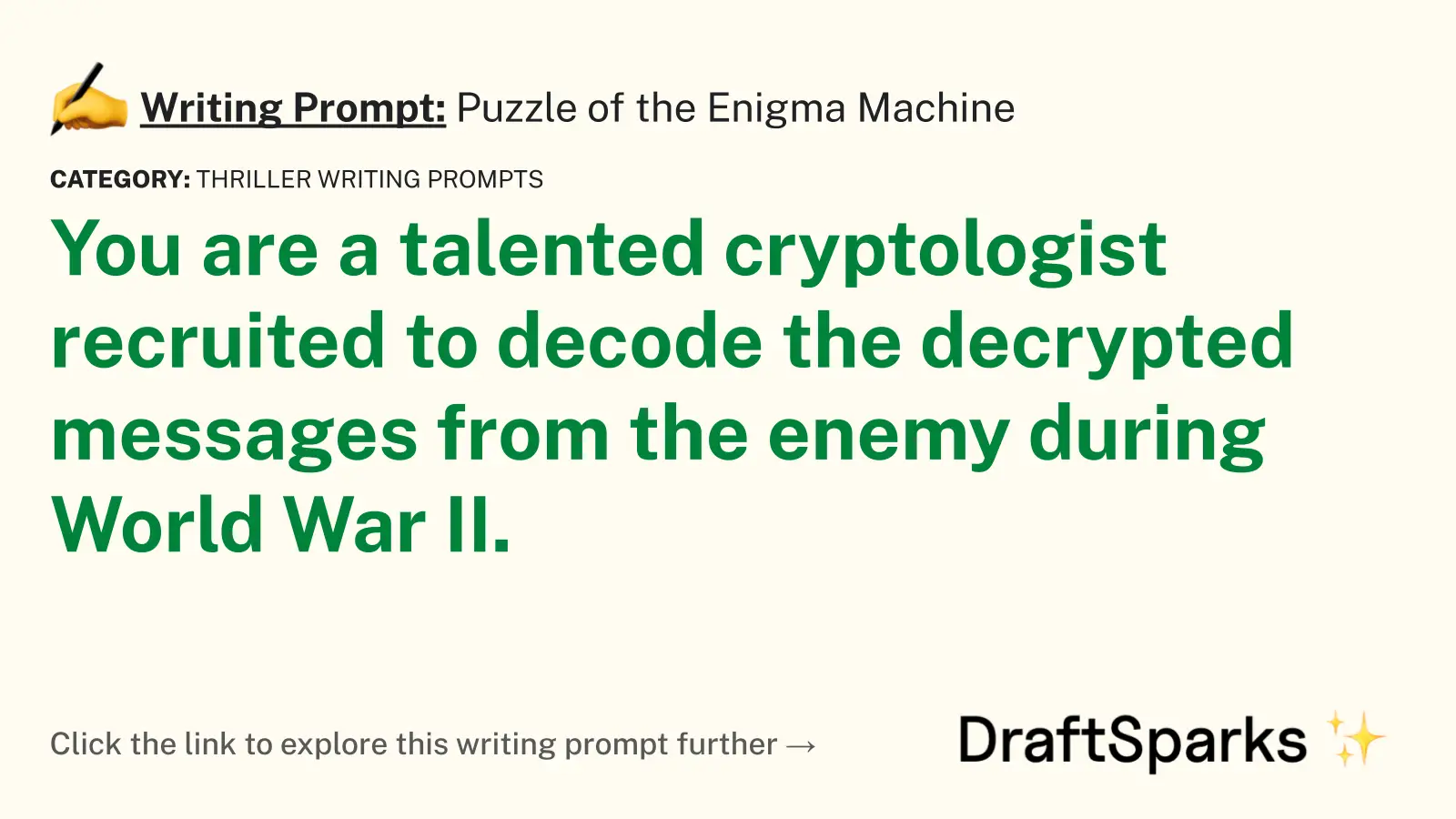
Puzzle of the Enigma Machine
You are a talented cryptologist recruited to decode the decrypted messages from the enemy during World War II.
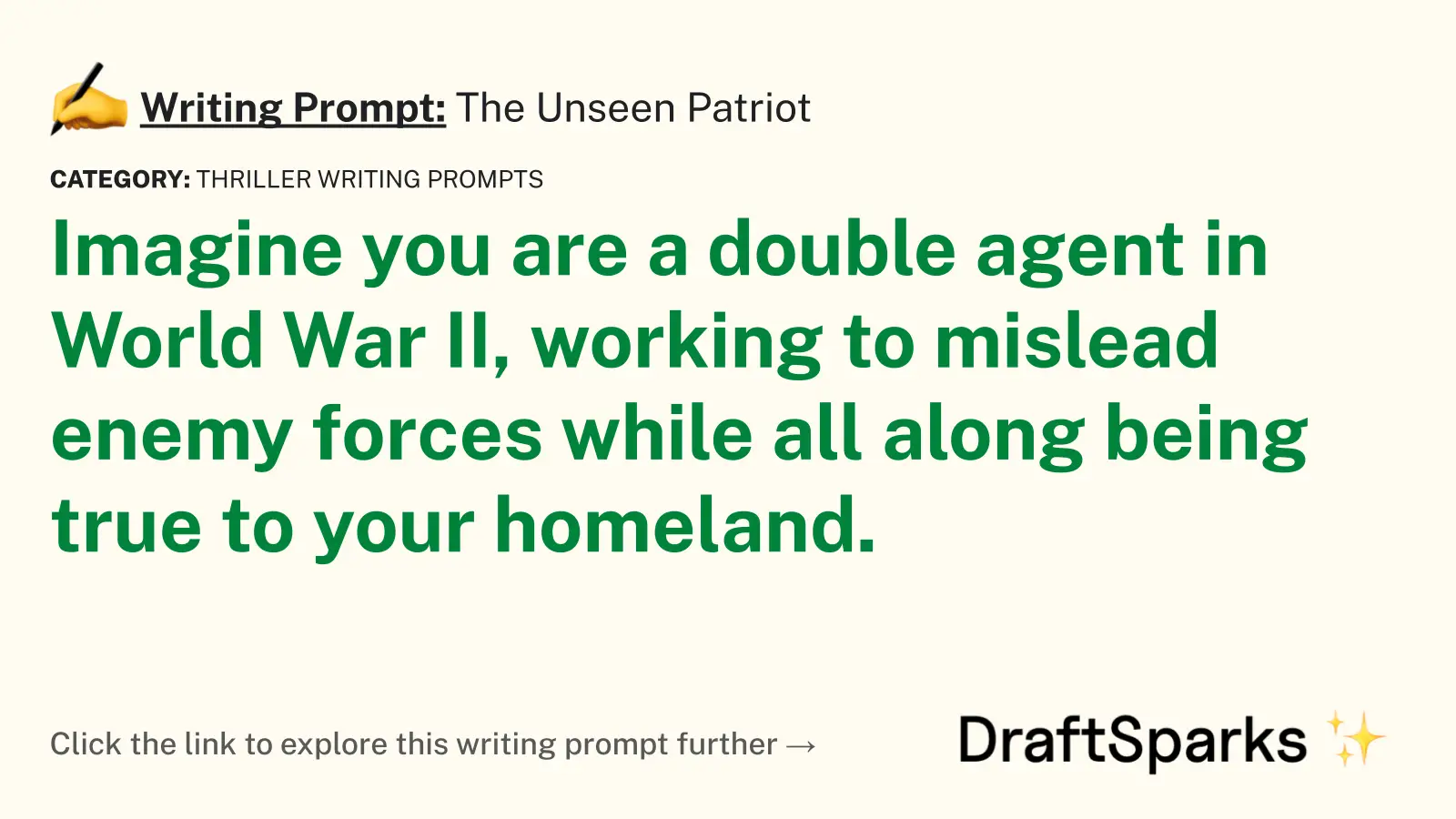
The Unseen Patriot
Imagine you are a double agent in World War II, working to mislead enemy forces while all along being true…
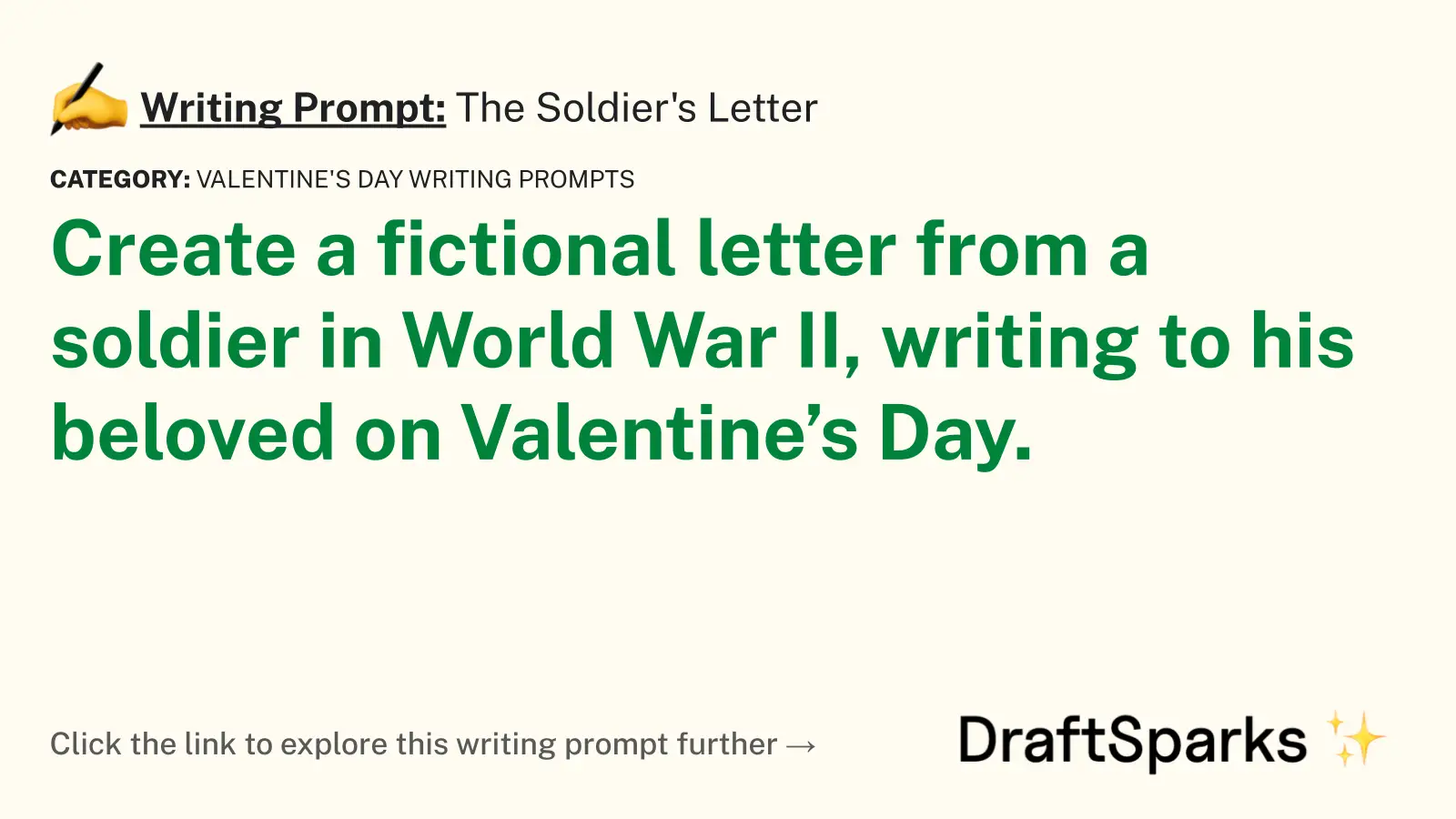
The Soldier’s Letter
Create a fictional letter from a soldier in World War II, writing to his beloved on Valentine’s Day.
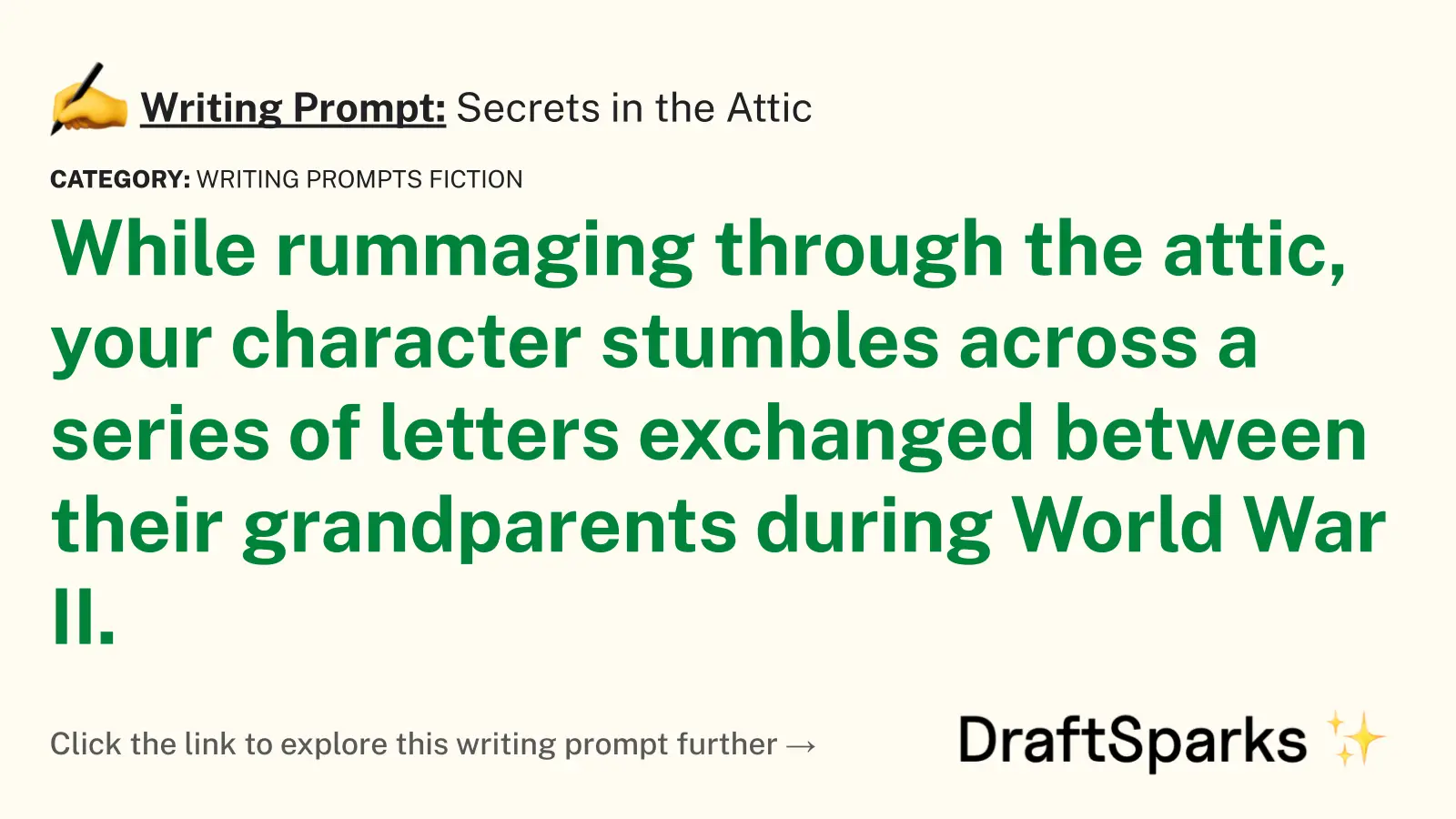
Secrets in the Attic
While rummaging through the attic, your character stumbles across a series of letters exchanged between their grandparents during World War…
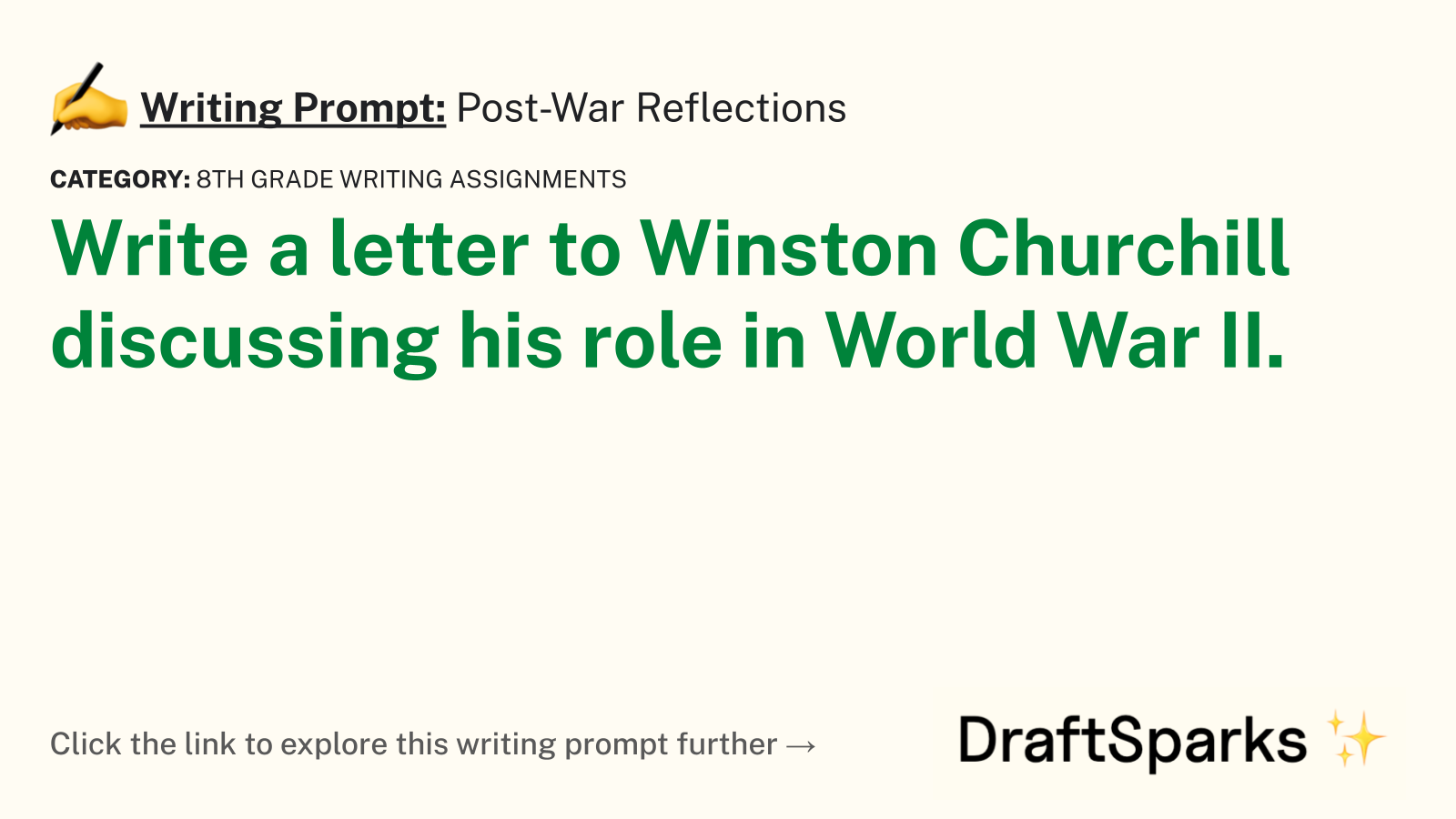
Post-War Reflections
Write a letter to Winston Churchill discussing his role in World War II.
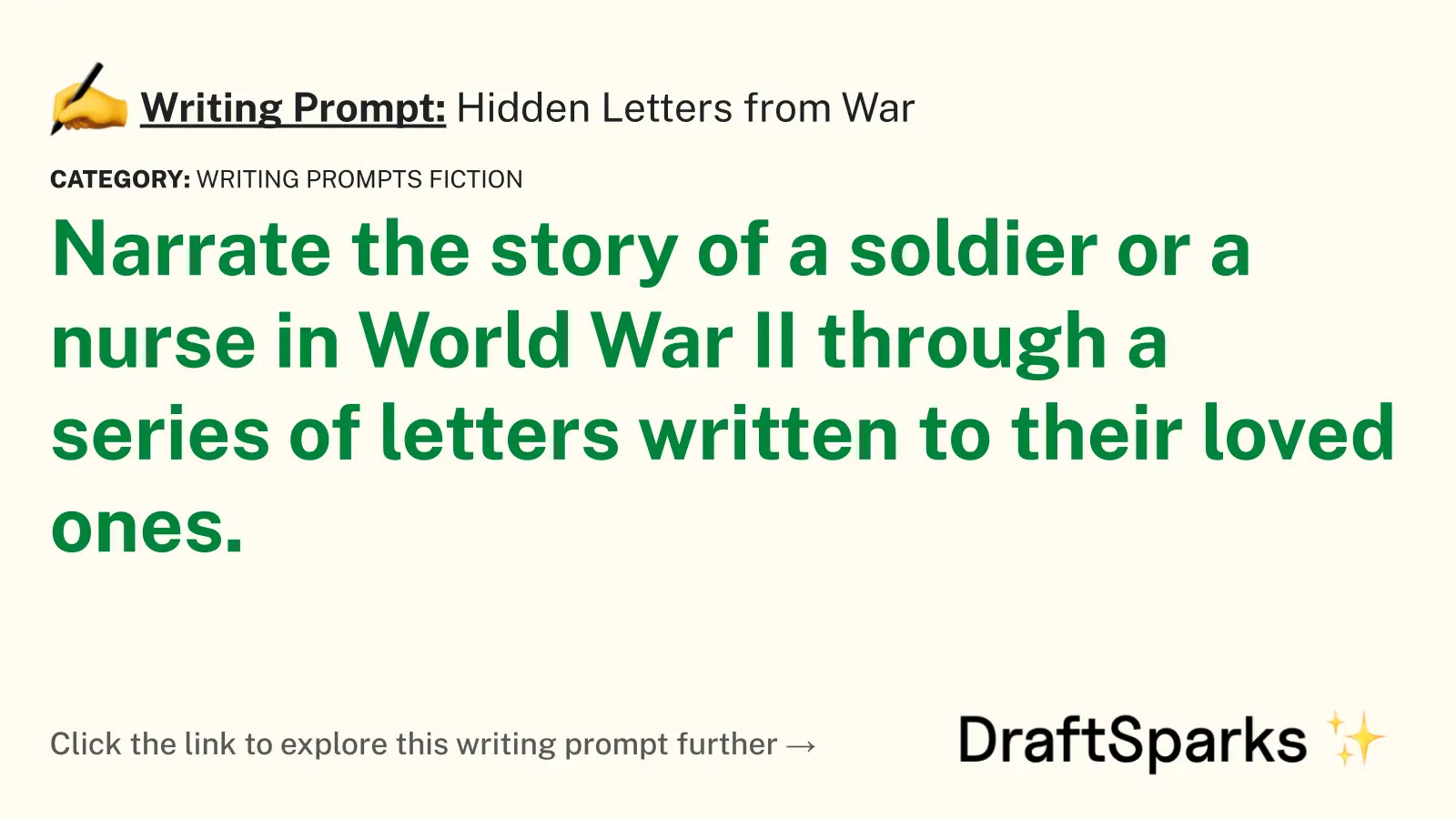
Hidden Letters from War
Narrate the story of a soldier or a nurse in World War II through a series of letters written to…
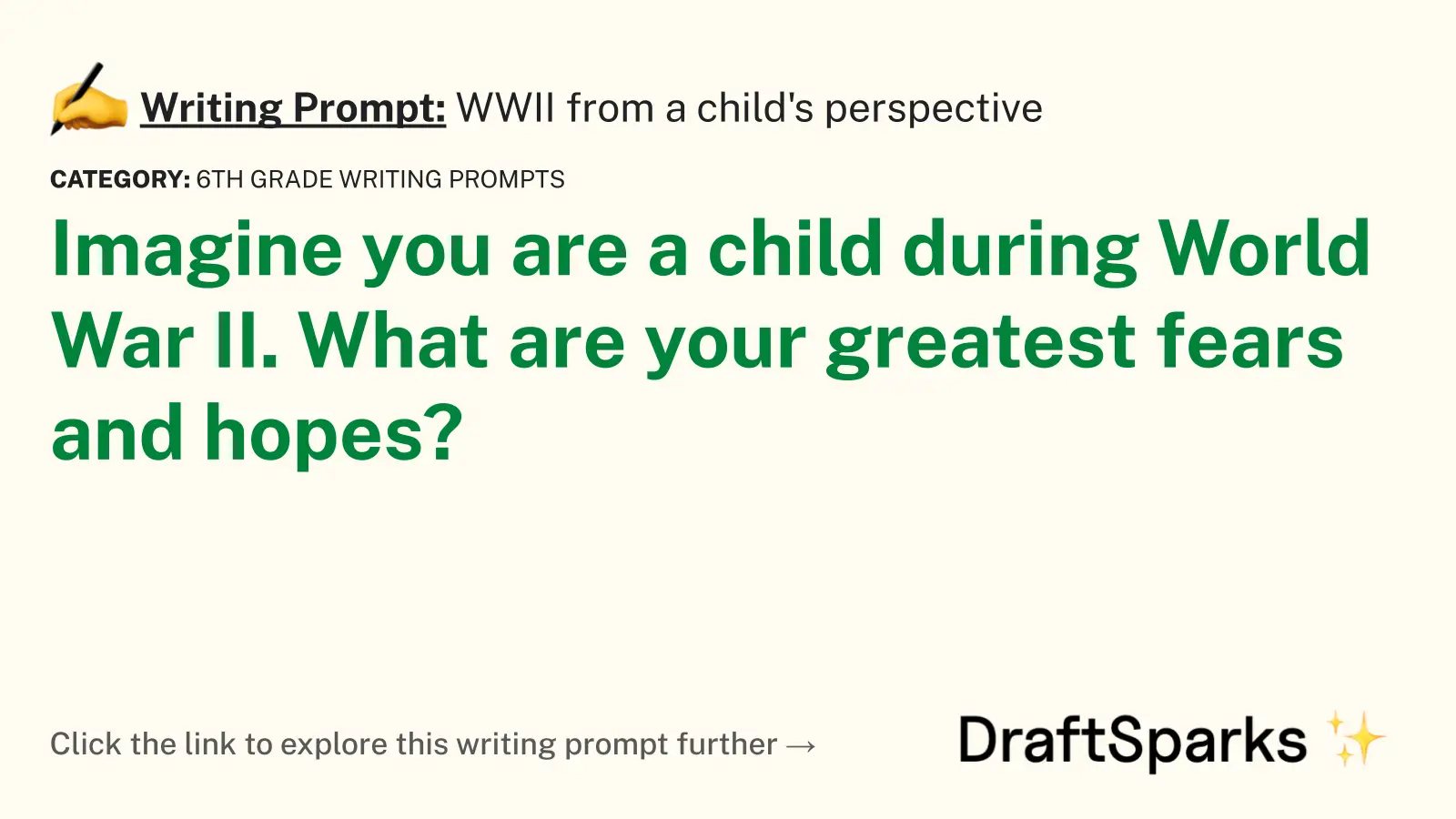
WWII from a child’s perspective
Imagine you are a child during World War II. What are your greatest fears and hopes?
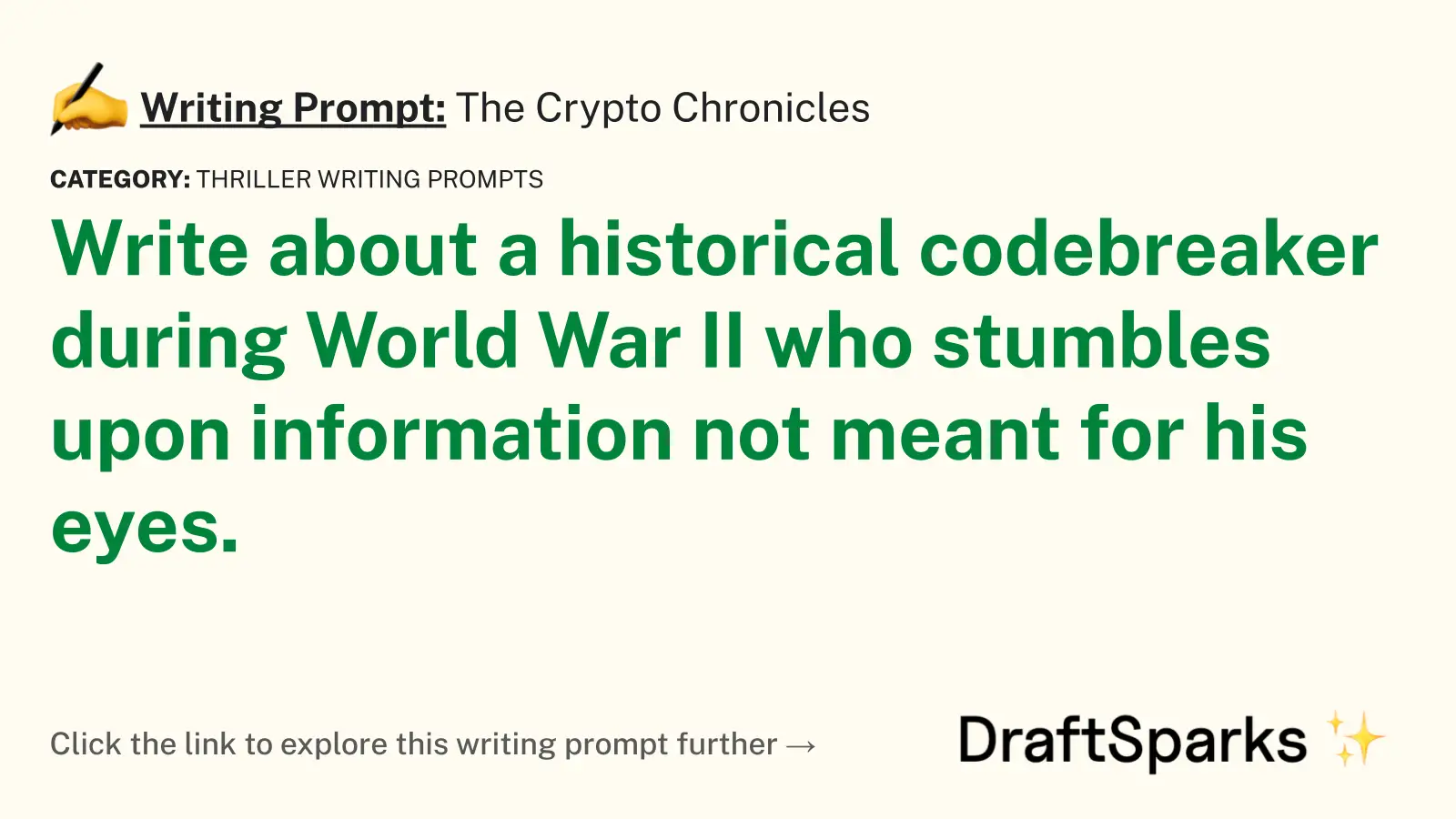
The Crypto Chronicles
Write about a historical codebreaker during World War II who stumbles upon information not meant for his eyes.
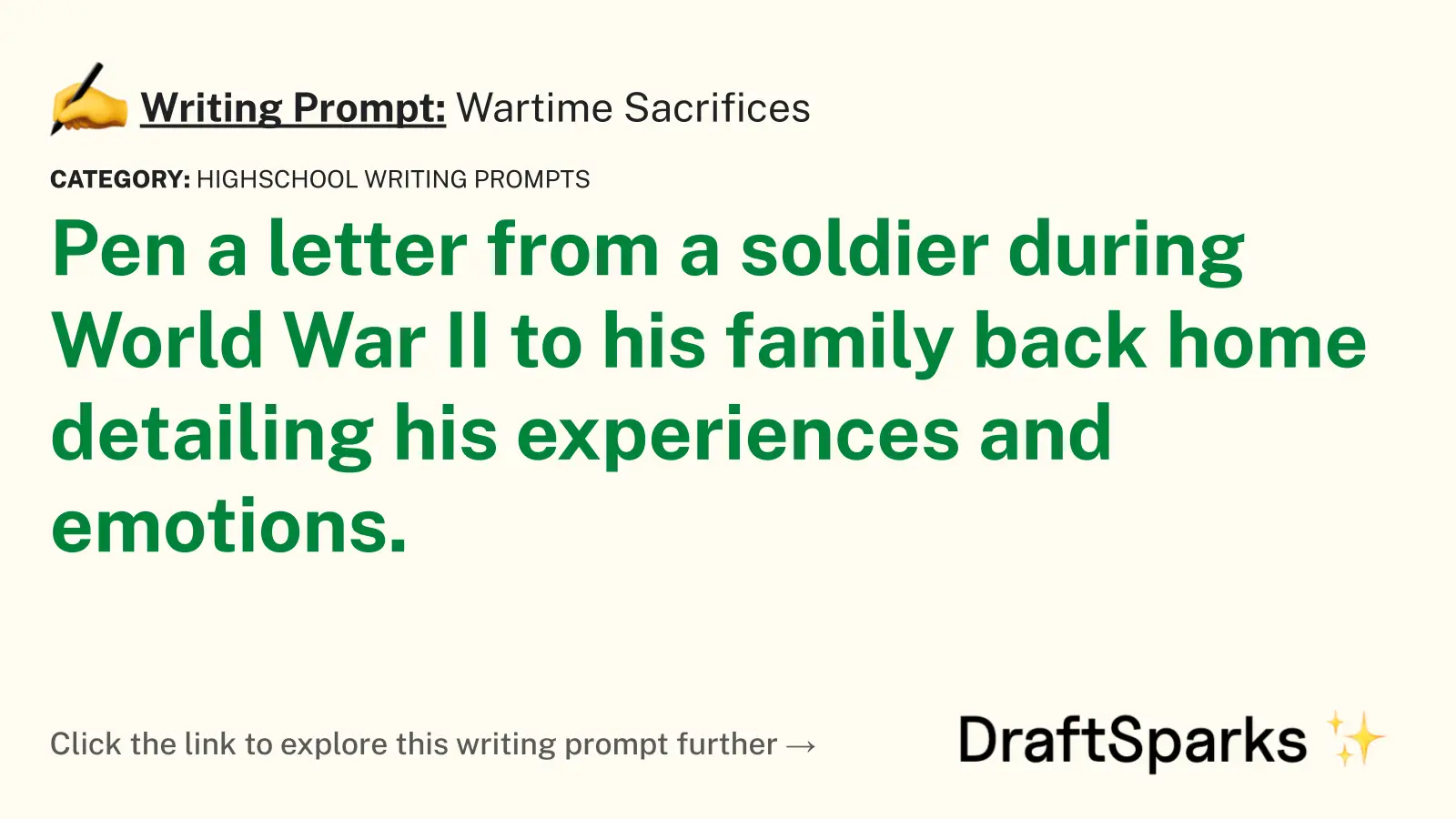
Wartime Sacrifices
Pen a letter from a soldier during World War II to his family back home detailing his experiences and emotions.
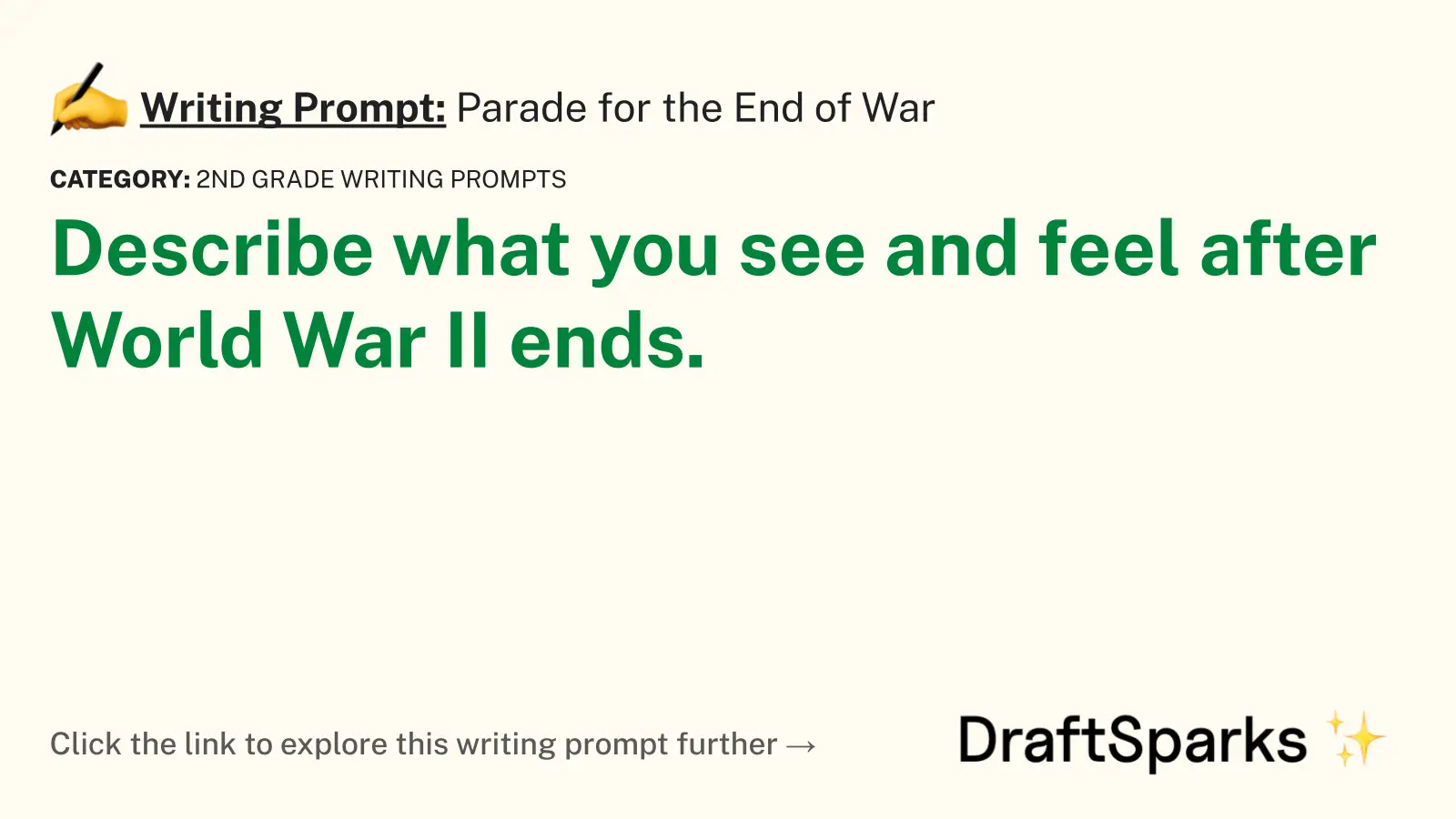
Parade for the End of War
Describe what you see and feel after World War II ends.
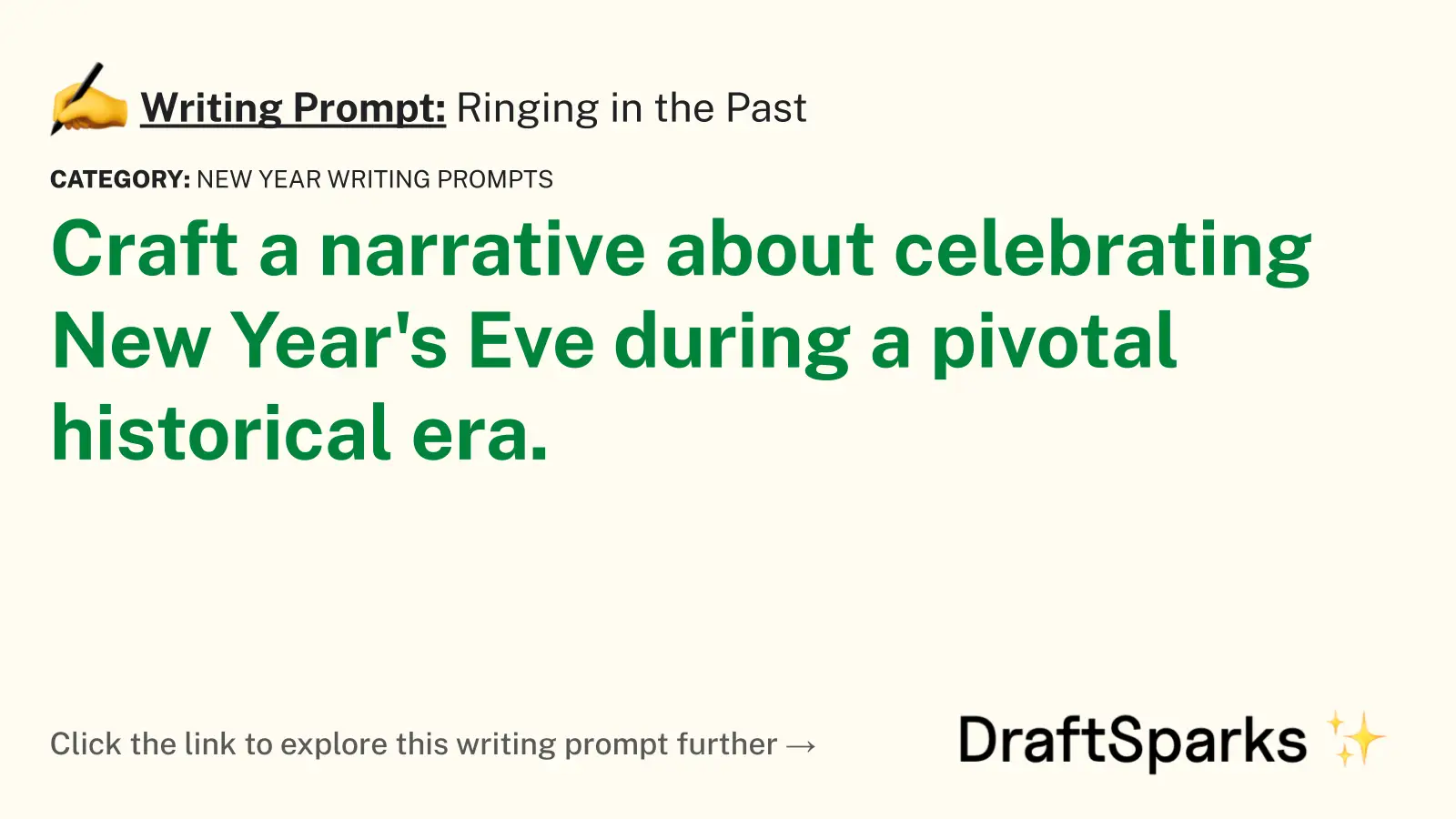
Ringing in the Past
Craft a narrative about celebrating New Year’s Eve during a pivotal historical era.
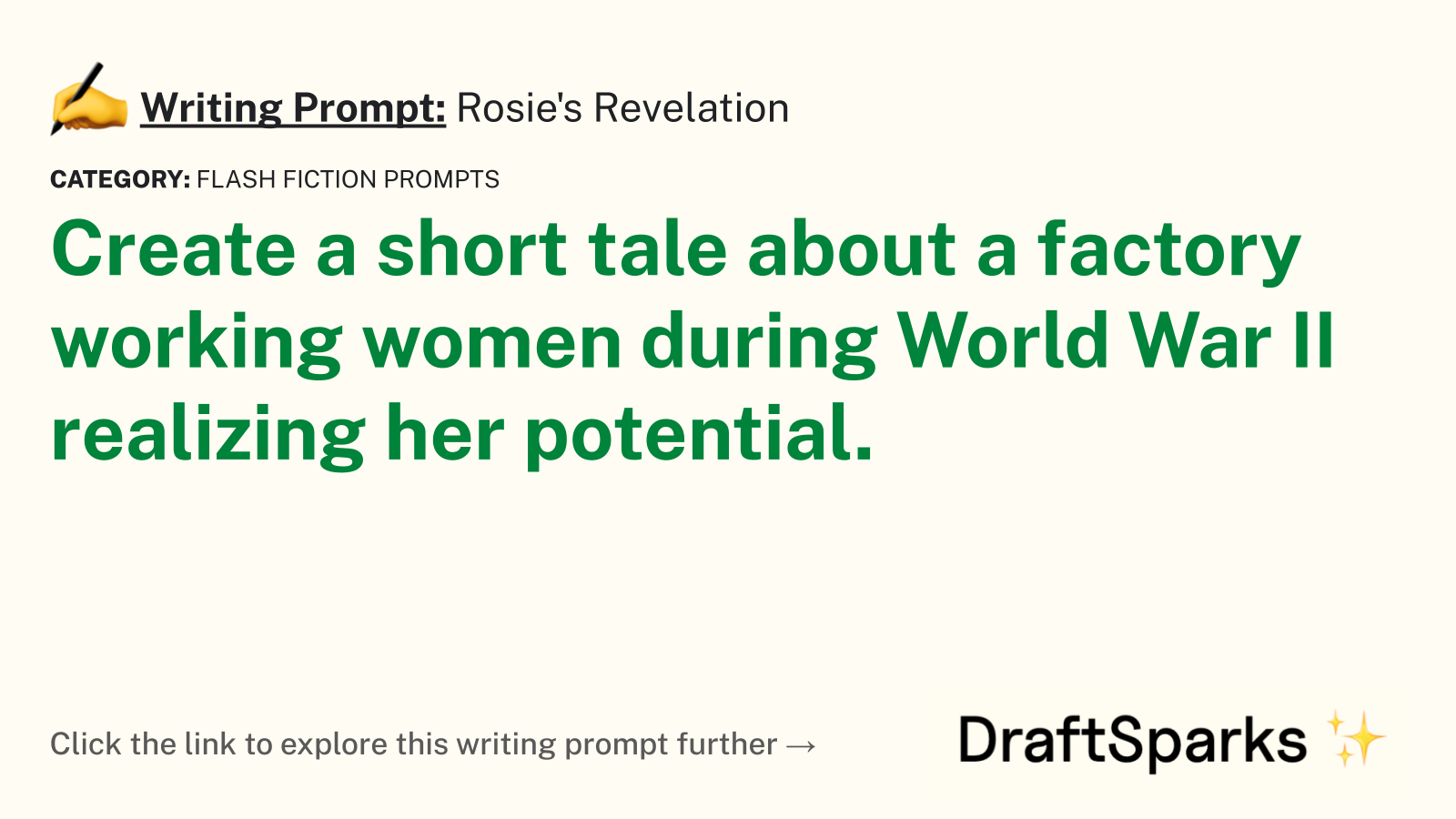
Rosie’s Revelation
Create a short tale about a factory working women during World War II realizing her potential.
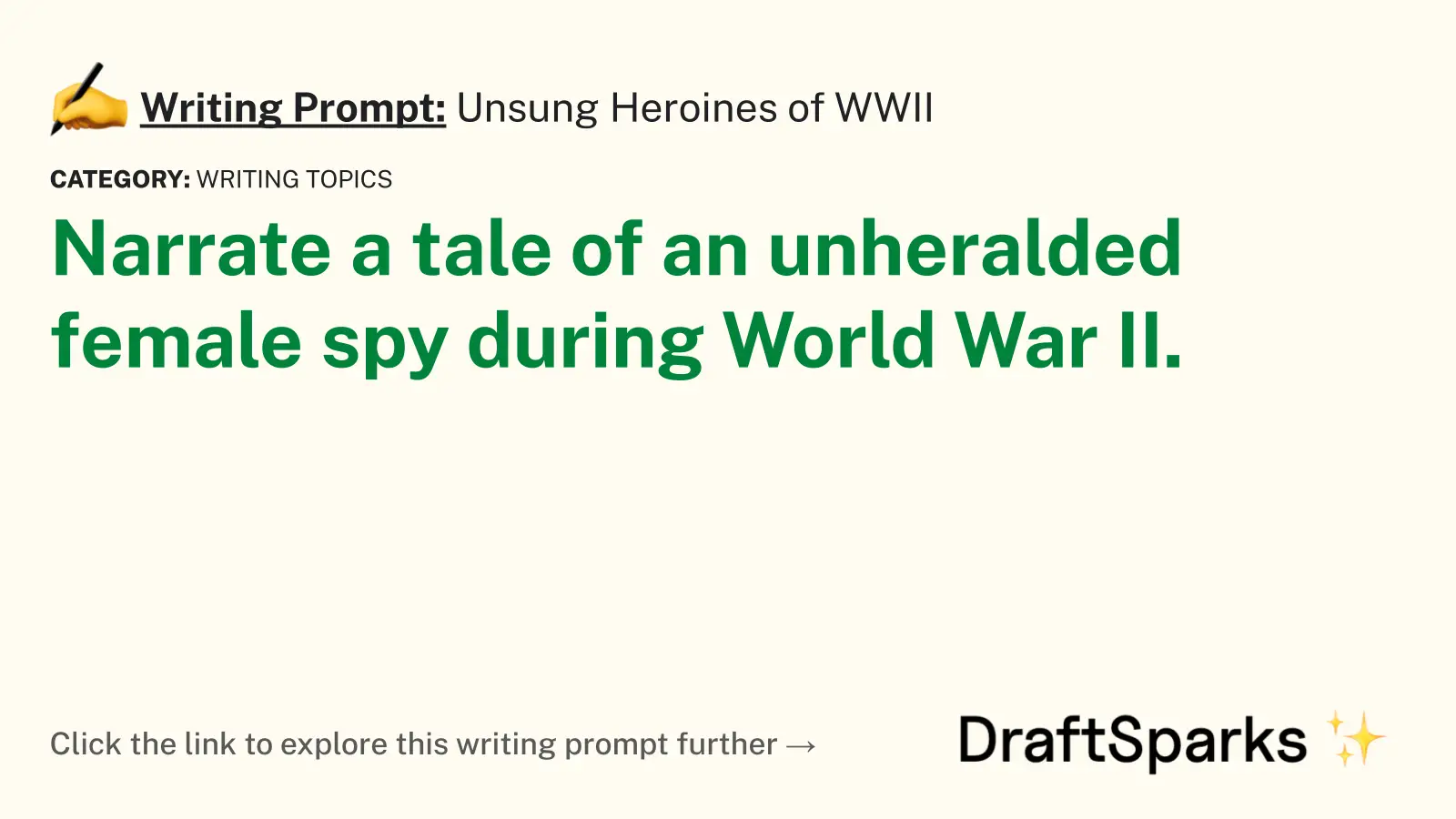
Unsung Heroines of WWII
Narrate a tale of an unheralded female spy during World War II.
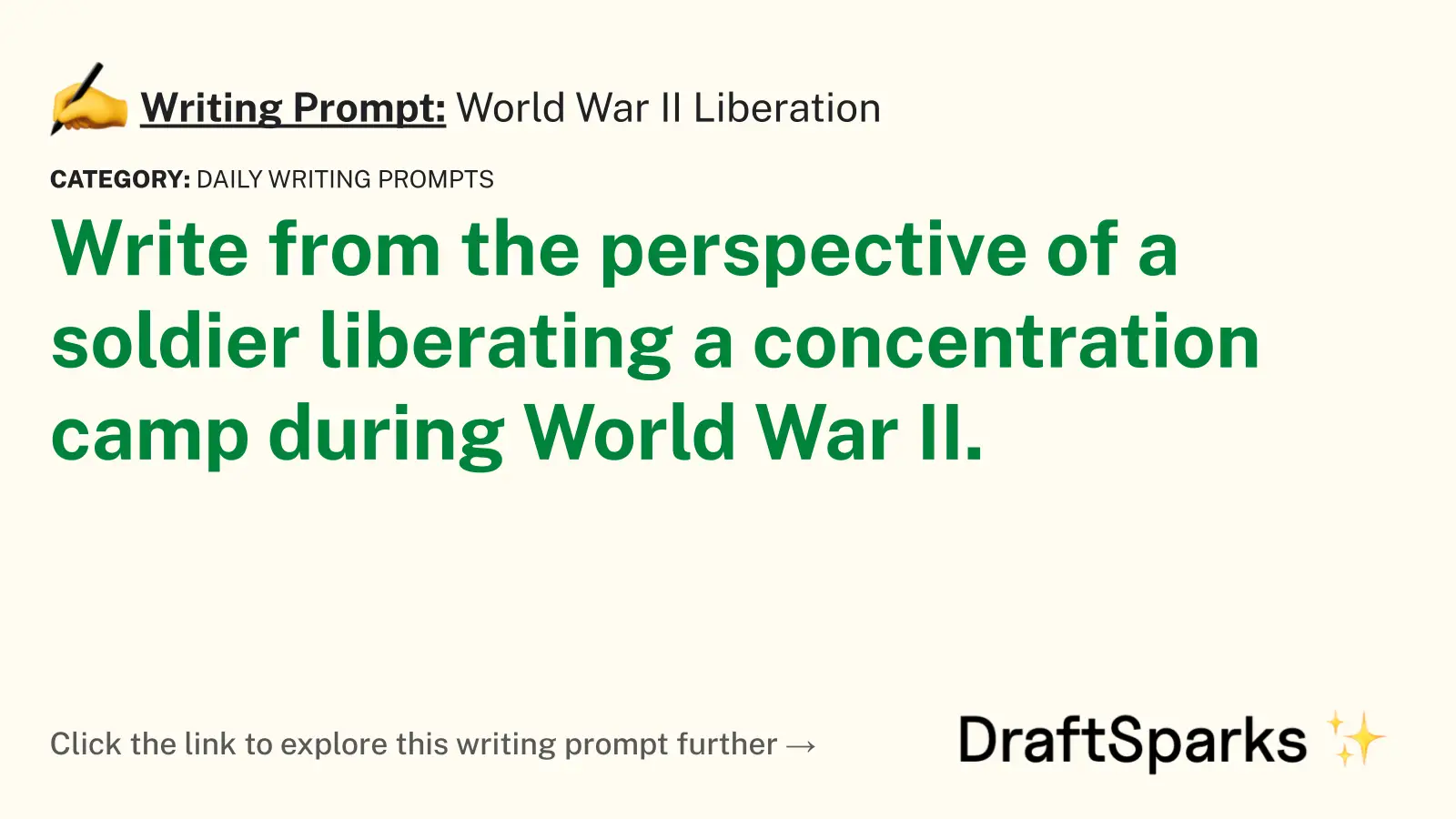
World War II Liberation
Write from the perspective of a soldier liberating a concentration camp during World War II.
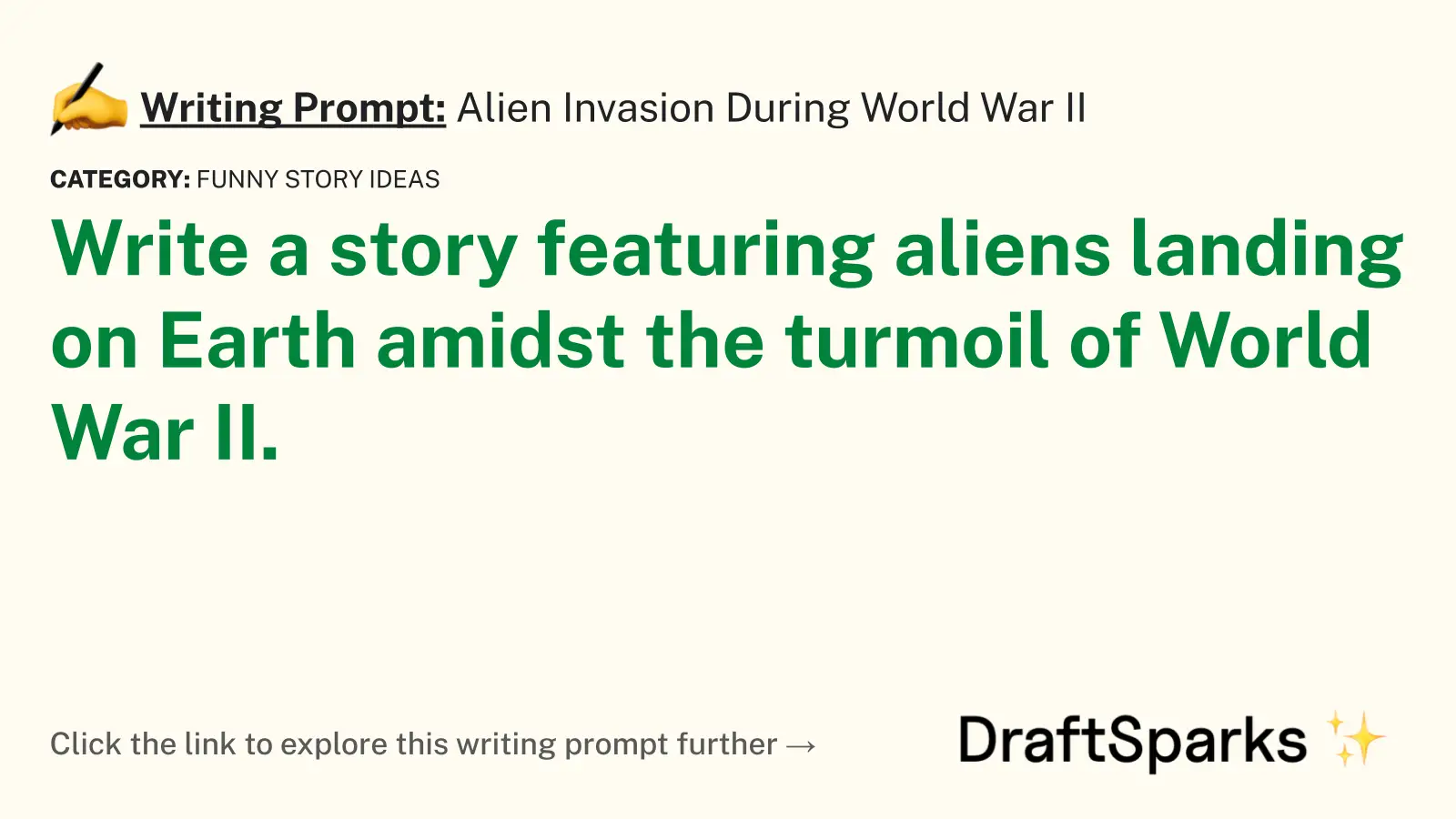
Alien Invasion During World War II
Write a story featuring aliens landing on Earth amidst the turmoil of World War II.
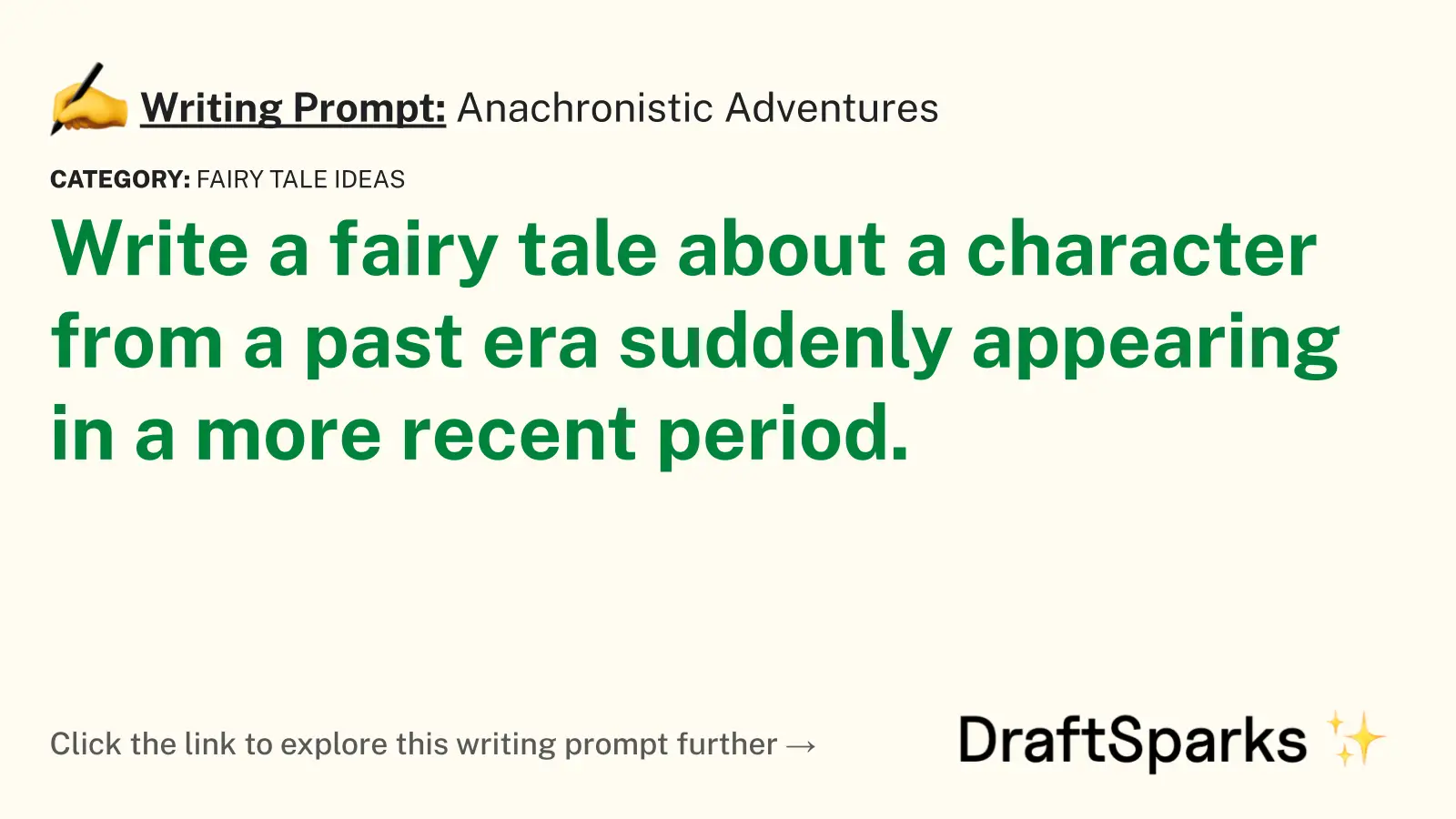
Anachronistic Adventures
Write a fairy tale about a character from a past era suddenly appearing in a more recent period.
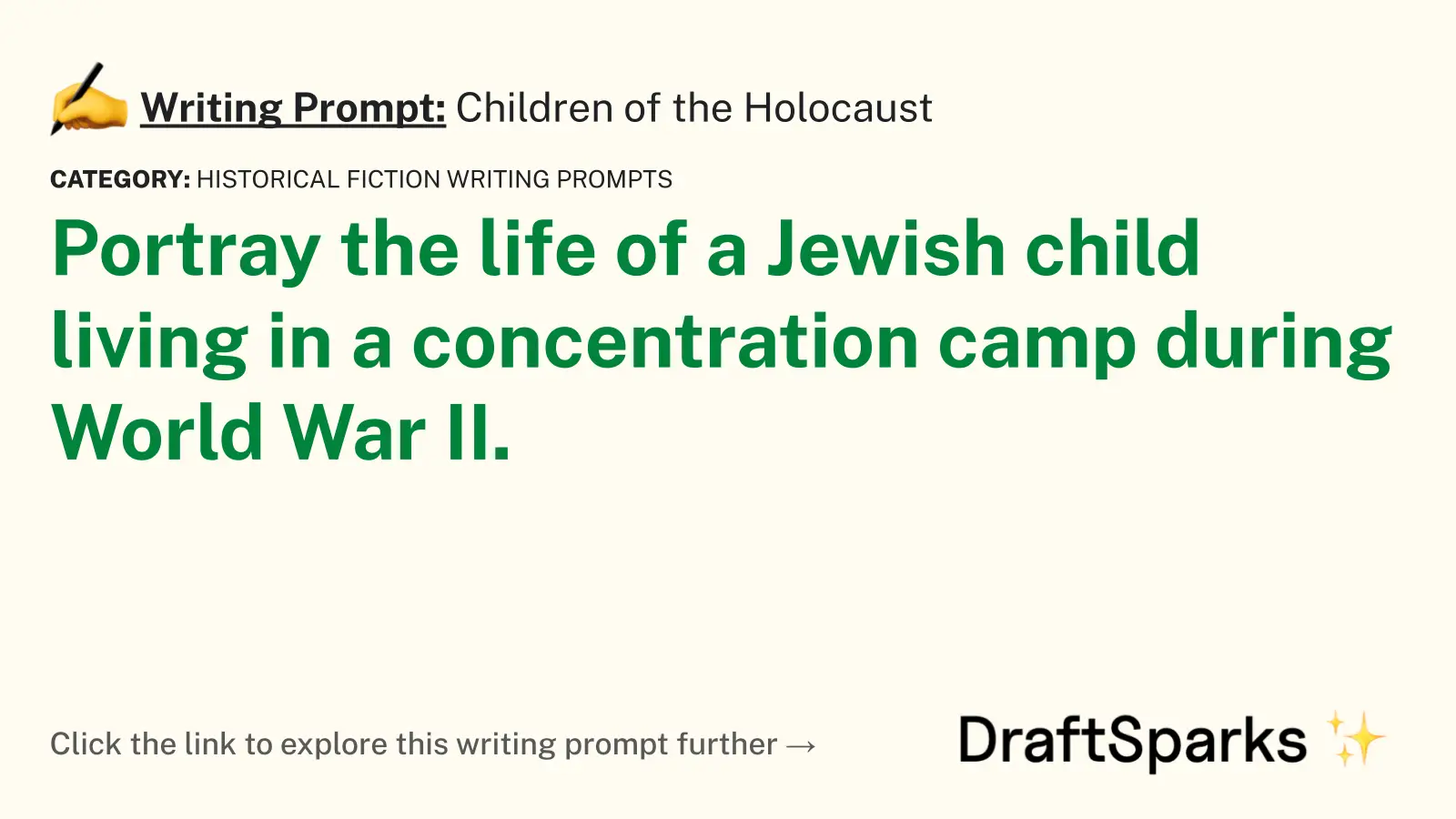
Children of the Holocaust
Portray the life of a Jewish child living in a concentration camp during World War II.
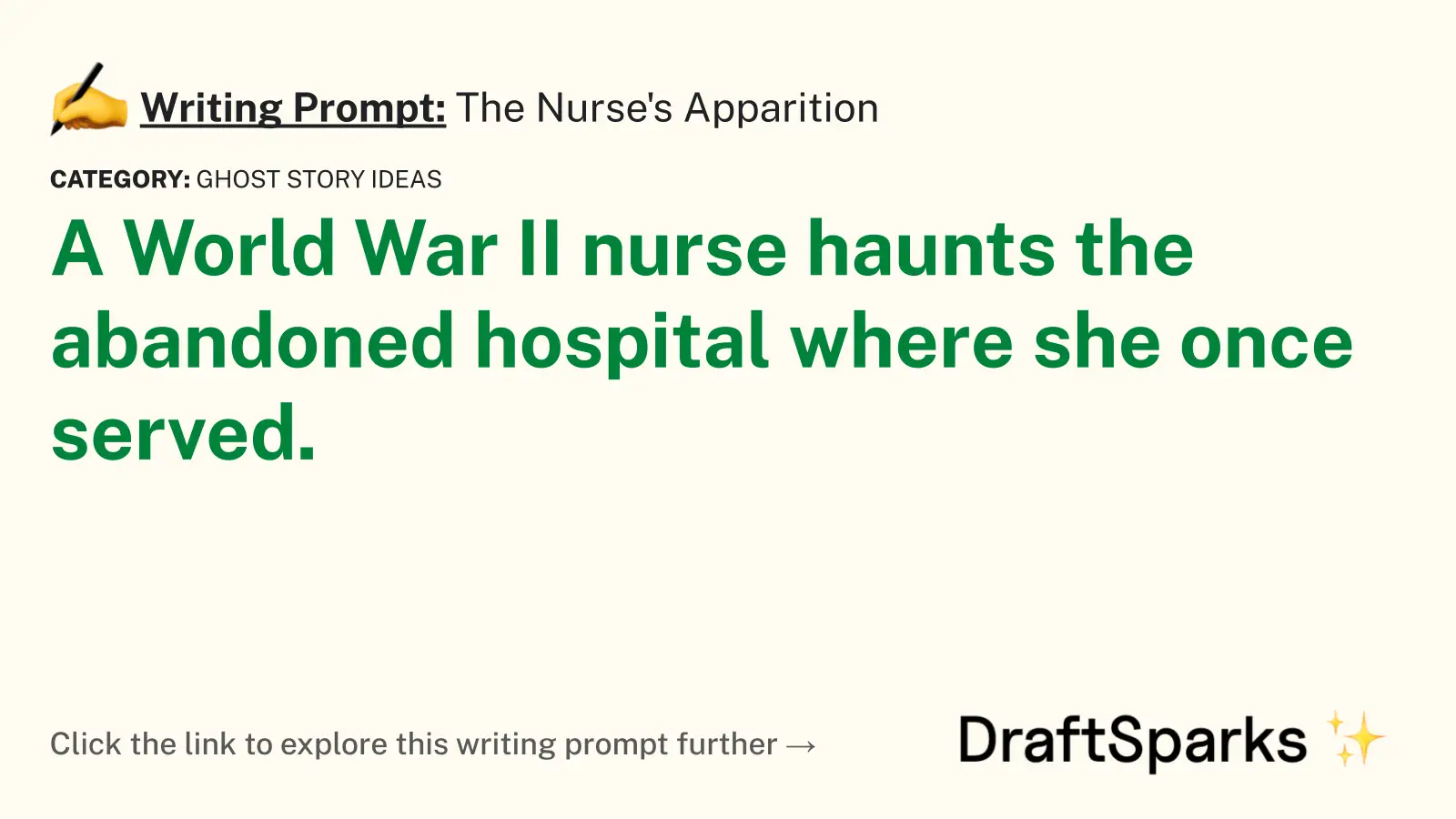
The Nurse’s Apparition
A World War II nurse haunts the abandoned hospital where she once served.
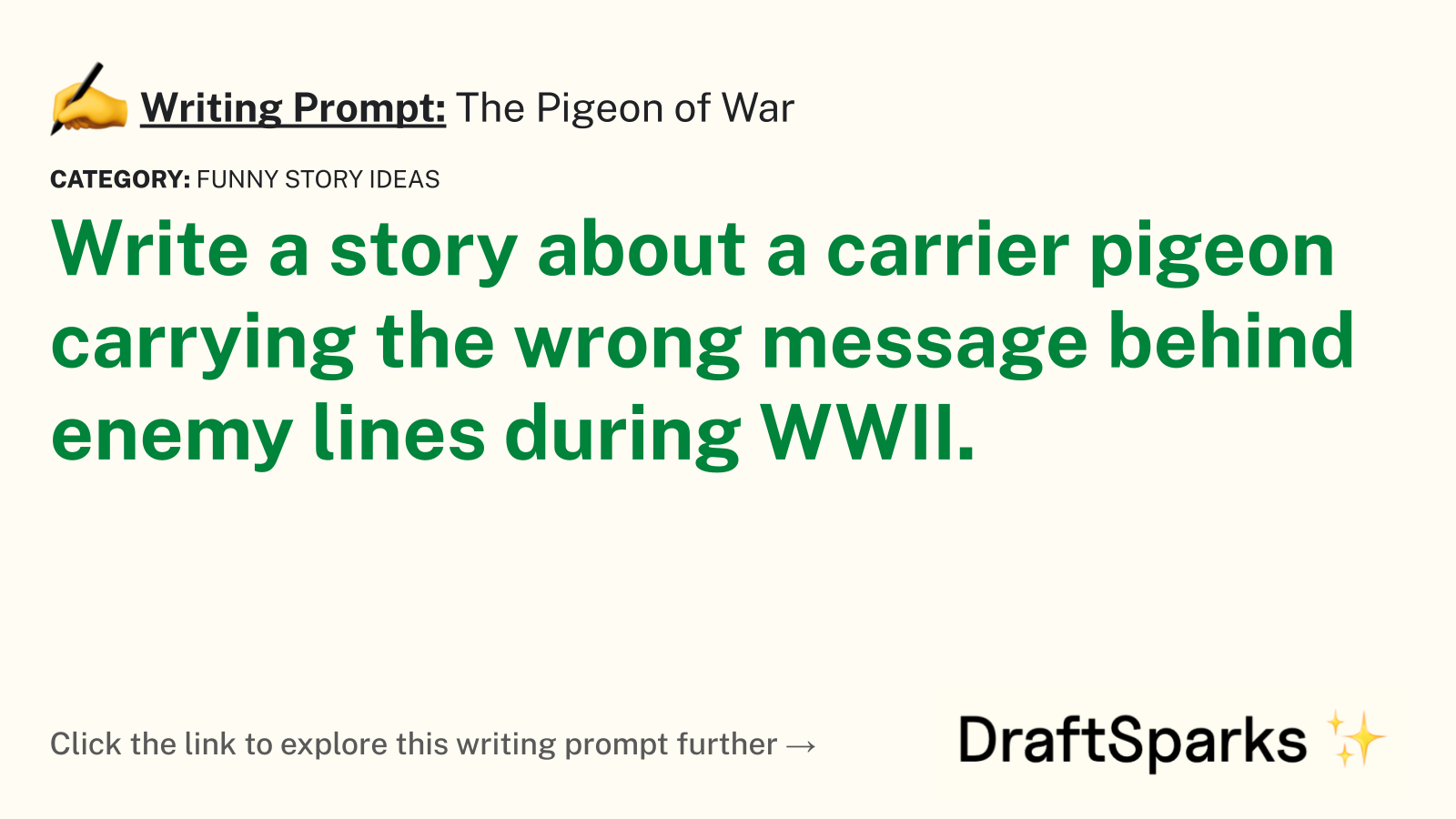
The Pigeon of War
Write a story about a carrier pigeon carrying the wrong message behind enemy lines during WWII.
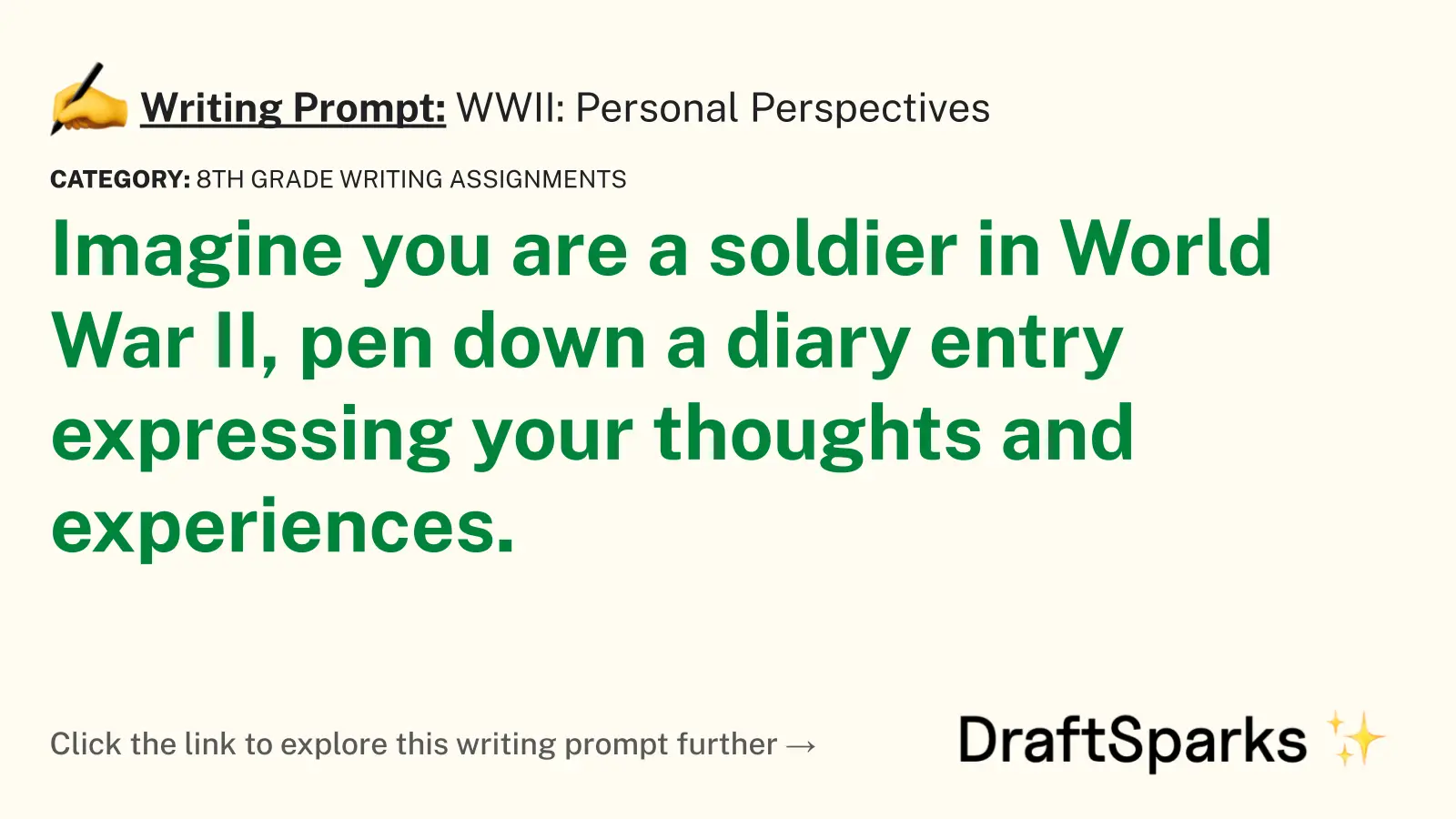
WWII: Personal Perspectives
Imagine you are a soldier in World War II, pen down a diary entry expressing your thoughts and experiences.
Historical Flight Deck
Set your story on an aircraft carrier during a significant historical event, detailing how the crew responds to the pressure…

Anime Through Decades
Explore how different eras have influenced the themes, style, and storytelling methods of anime.
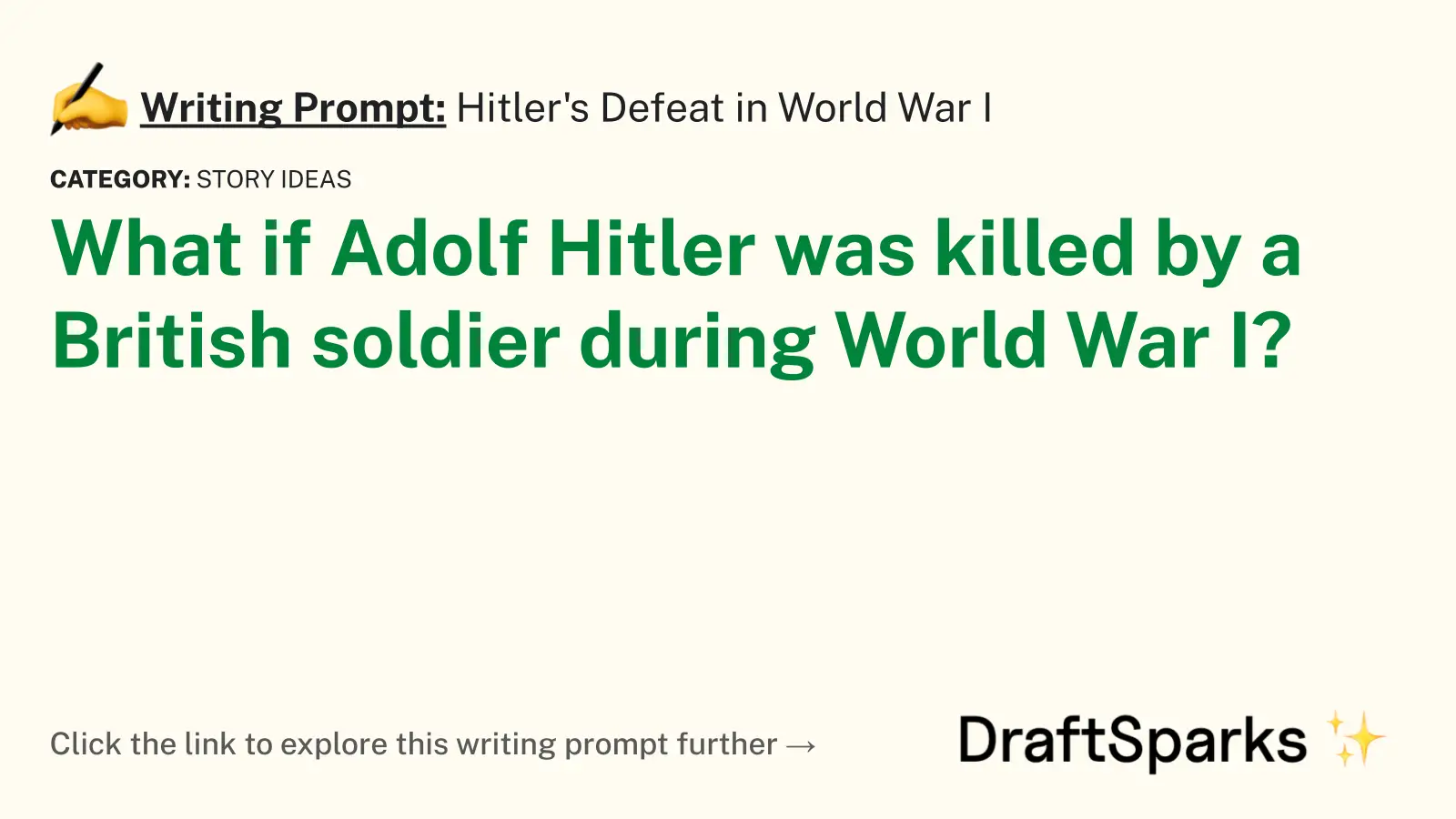
Hitler’s Defeat in World War I
What if Adolf Hitler was killed by a British soldier during World War I?
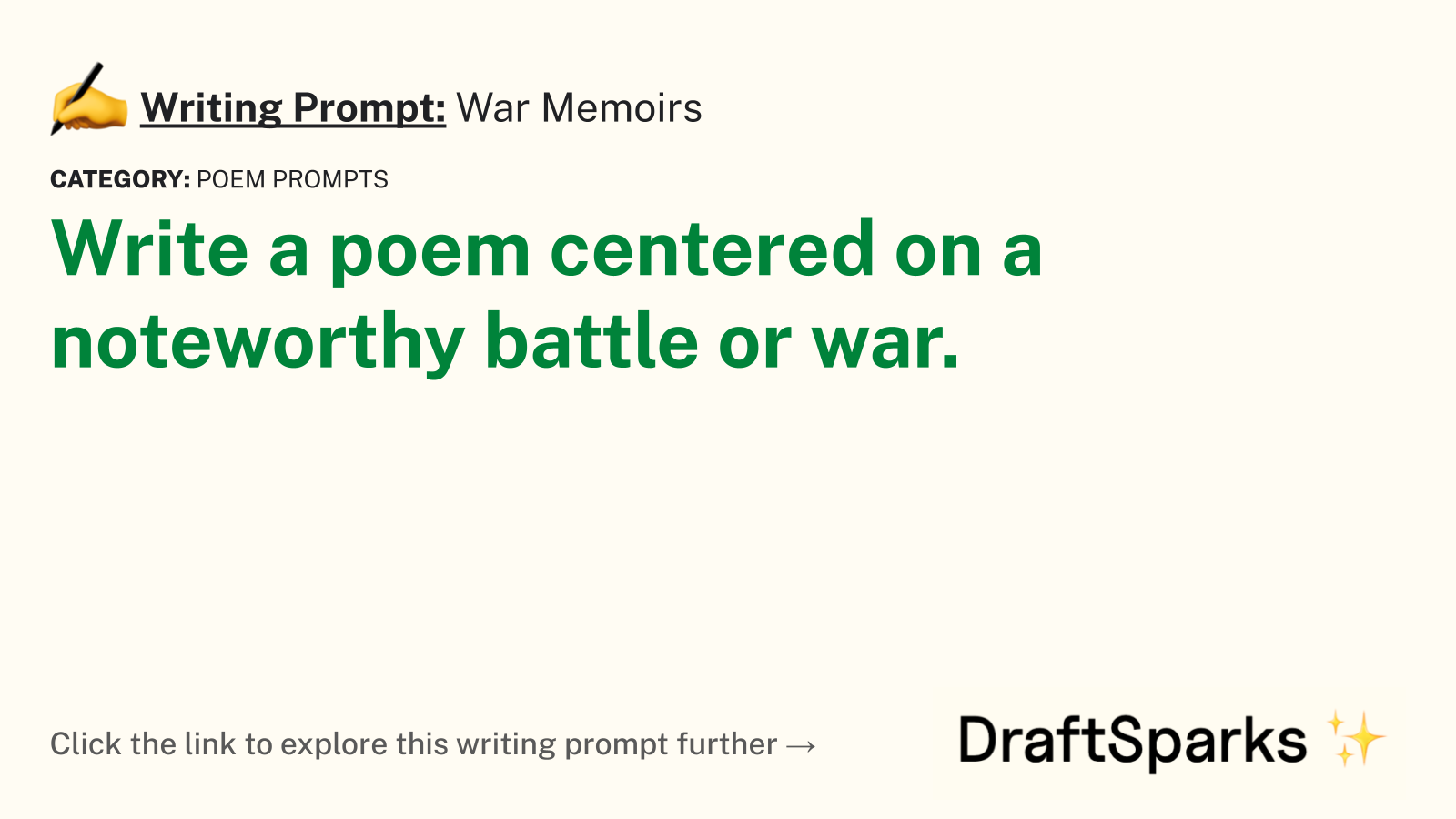
War Memoirs
Write a poem centered on a noteworthy battle or war.
Letters from the Front Line
During World War II, write a series of letters from a soldier on the frontline to their loved ones at…
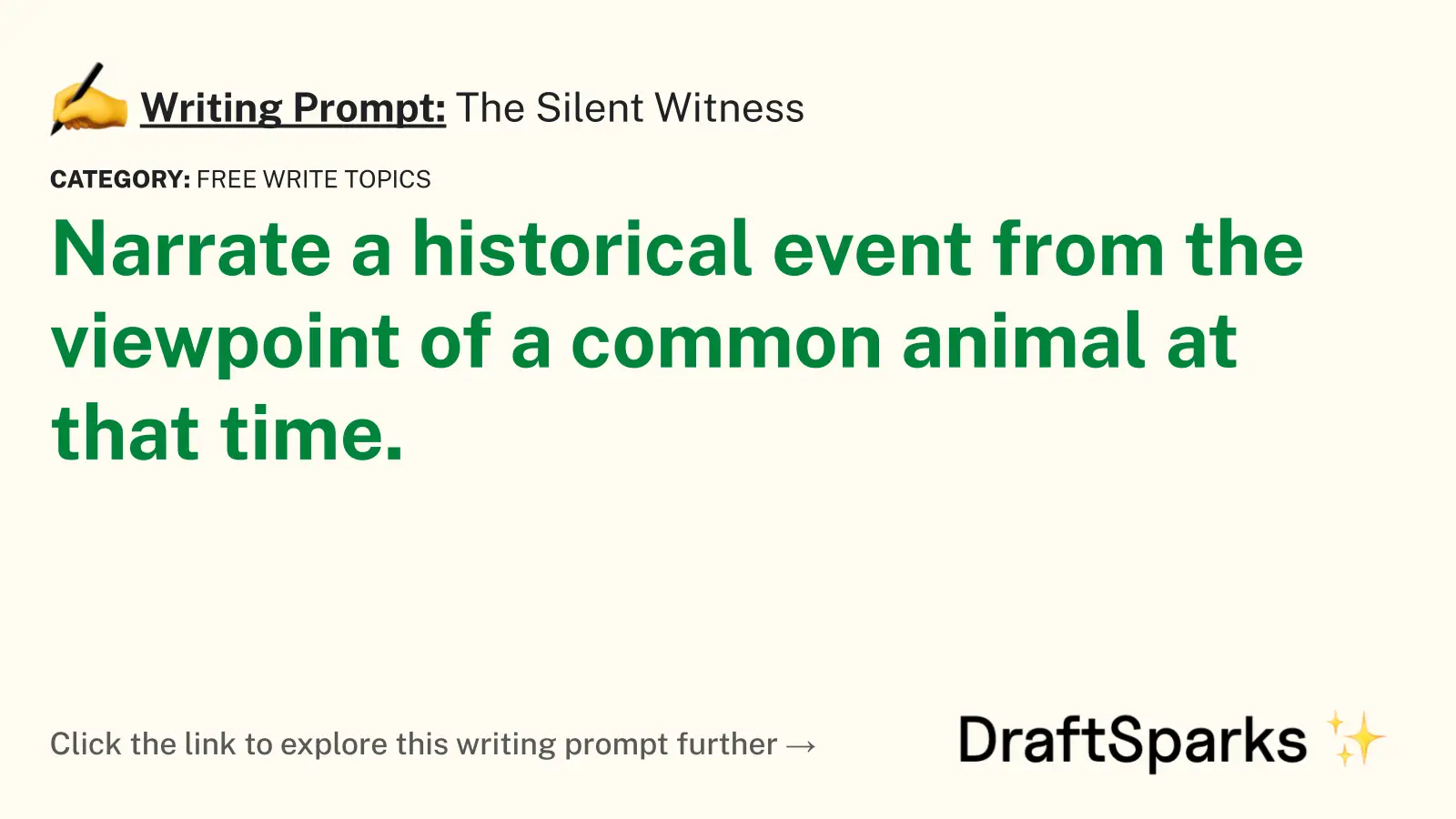
The Silent Witness
Narrate a historical event from the viewpoint of a common animal at that time.
Persona Journals are Creative Activities for World War II Lesson
- Kellie Hayden
- Categories : Teaching middle school history
- Tags : Teaching middle school grades 6 8
Persona Journal Lesson
Goal : Students will complete research on people affected by the war and write fictional journal entries based on their experiences. This lesson could be used with middle school and high school students.
Steps for Lesson on Writing a World War II Persona Journal
Step 1 – Gather books and Internet sites on World War II. It is helpful to schedule time in the computer lab for this activity.
Small Cooperative Group Work
Step 2 – Break students into groups of four-to-five students. Have cards prepared ahead of time with the words: survivor, passionate, conflict and personal growth. Each group needs to brainstorm words that connect to the word on their card for five to ten minutes. Then, the groups will share words and try to come up with an overarching theme. Maybe they would come up with hero or challenges. These words could describe the people who lived during the war.
Step 3 – For the World War II series, students will be focusing on five areas: war in the Pacific, war in Europe, the Manhattan Project, the Holocaust and important leaders. Share these five areas with the students. If you are trying to integrate this with social studies, the social studies teacher will focus on these four areas in his or her lessons.
Choosing a Person from WWII
Step 4 -- Tell students that they will take on the persona of a person who lived through this time period and write at least five journals about their lives and experiences. Some possible personas to assume are as follows:
- German soldier
- American soldier
- Holocaust survivor
- Japanese internment prisoner
- European child caught in the crossfire of battle
- Survivor of one of the atomic bombs
Step 5 -- After students have chosen a persona, they need to do some research on what it would have been like to be that person during World War II. This research can be done in the school library on in the computer lab online.
Students Create and Write a Persona Journal
Step 6 – Create a journal. This journal should be individualized in its cover and pages. Students need to write at least five one page entries with dates that correspond to historical events or during the time period. Events can be fictional events that center around the time period and happenings that major historical relevance.
It works best to start this at the beginning of this unit. Give students a deadline when all of the entries should be completed.
Assess Journals Using a Rubric
Step 7 – Assess the journal using a rubric . Criteria for the rubric could be pages completed, historical relevance, writing using persona, creativity and grammar and spelling.
This journal activity makes students think about what it really was like during the time period. It is a creative writing opportunity that may make them think about things a little differently.
This post is part of the series: World War II Creative Activities
A four part series of lessons on how to integrate social studies and language arts with the study of World War II. The lessons use many of Howard Gardner’s Multiple Intelligences.
- Persona Journals for World War II
- Lesson Plan: Recreating A WWII Era USO
- Writing and Producing a Newspaper for the WWII Time Period
- WWII Creative Actitivies: Literary Analysis

Creative Writing Club – members' area
² navigation, resources to print – world war ii, printable writing frame.
Download a printable Dunkirk writing frame: dunkirk_storymaker.pdf Download the Home front writing frame: home_front_storymaker .pdf
Download the WW2 Football KIT Quiz pdf
TIP: There are lots of ways to use Creative Writing Club you can use the App or do it with pen and paper – using the printable version. (Teachers will need one sheet between two students).
LEVEL: (blue = easiest, purple = medium, green = hardest)
How to use in class (Demo using App followed up by pen and paper).
- Log onto Creative Writing Club. Use your Interactive White Board to do a demo of the story writing activity to the whole class. (Get the class to vote on the options as you go. Use the ‘next’ button in the bottom right of the screen if you need to move on).
- Get the class into pairs and hand out a printed version of the writing frame.
- Tell students to write the story one line each – from the most exciting part.
- Tell them to put their hands up if they are going to write the first line. ‘First liners’ should write a line of speaking.
- ‘Second liners’ should write a line of describing.
- After this they can write anything they like: speech, description, action etc.
- At the end of the session, choose some pairs to come up and share their work with you.
Tip: If you are working on paper, you can still submit work to our Hall of Fame . Take a picture of the story and email it to us.
Page border to print (Coming Soon)
World War II Writing Prompts - Printable & Digital Activities

- Google Apps™
Also included in
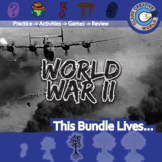
Description
A play on the Adventure-style books of your childhood, an Adventure prompt set allows students choice to write a historical narrative from the perspective of someone from the time period.
Students use their imagination to put themselves into the shoes of someone else while supporting their work with historical facts and elements of the culture.
Each prompt is included as a full-page and half-page for your convenience.
And join our community where I post ideas, anecdotes, elaborations & every once in a while I pass out TPT gift cards! And jokes! I do jokes too!
Clark Creative Education Facebook Page
Questions & Answers
Clark creative world.
- We're hiring
- Help & FAQ
- Privacy policy
- Student privacy
- Terms of service
- Tell us what you think
- Primary Hub
- Art & Design
- Design & Technology
- Health & Wellbeing
- Secondary Hub
- Citizenship
- Primary CPD
- Secondary CPD
- Book Awards
- All Products
- Primary Products
- Secondary Products
- School Trips
- Trip Directory
- Trips by Subject
- Trips by Type
- Trips by Region
- Submit a Trip Venue
Trending stories

Top results

- Teaching Resources
- The Tunnel Pie Corbett Original Wwii Model Text And Lesson Plan For Ks2 Literacy
WW2 for KS2 – Model text and lesson plan by Pie Corbett

Original story, classroom activity ideas and a PowerPoint of the story
English , History
By using Pie Corbett’s WW2 KS2 model text and digging into local history, your class can write a powerful piece about the experience of a WW2 evacuee.
This resource includes an original story called ‘The Tunnel’, plus a series of reading and writing classroom activities.
There is also a PowerPoint file with the story on so your class can read along with you.
WW2 KS2 resources
Writing a story set in the past means you have to do some research. This story is about an evacuee and is based on facts.
The plot pattern hangs around the simple idea of a character having to face something they fear. The opening lines give the main theme away:
“Henry had always hated the dark”
The reader immediately knows that Henry will have to face the darkness. In these sorts of stories, the main character often defeats or overcomes their fears. In this one, there is light at the end of the tunnel for Henry.
More novel suggestions
Excellent novels to read alongside this resource are:
- Friend or Foe by Michael Morpurgo
- Carrie’s War by Nina Nawden
- Fireweed by Jill Paton Walsh
- Blitzcat by Robert Westall
More resources

Download more great free Pie Corbett stories and classroom ideas . Alternatively, explore our list of the best WW2 books and browse more WW2 KS2 resources .
Pie Corbett is an English educational trainer, writer, author and poet who has written over 200 books. He is also known for promoting creative approaches in the classroom and has experience as a teacher, headteacher and Ofsted inspector. Follow him on Twitter at @PieCorbett .
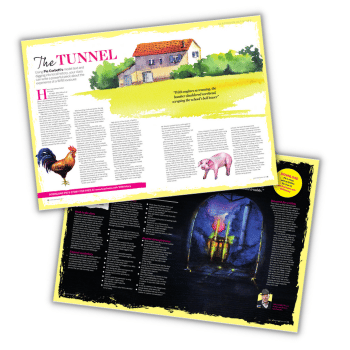
Similar resources
- Year 5 comprehension – Astronaut interview and worksheets
- Possessive apostrophe KS2 – Attenborough wildlife clips Y5 lesson
- KS2 William Shakespeare – Banish the Bard’s ‘boring’ reputation
- Over and Under the Snow – KS1 animals and habitats activities
- The Detective Dog – KS1 cross-curricular activities
Sign up to our newsletter
You'll also receive regular updates from Teachwire with free lesson plans, great new teaching ideas, offers and more. (You can unsubscribe at any time.)
Which sectors are you interested in?
Early Years
Thank you for signing up to our emails!
Explore teaching packs

Why join Teachwire?
Get what you need to become a better teacher with unlimited access to exclusive free classroom resources and expert CPD downloads.
Exclusive classroom resource downloads
Free worksheets and lesson plans
CPD downloads, written by experts
Resource packs to supercharge your planning
Special web-only magazine editions
Educational podcasts & resources
Access to free literacy webinars
Newsletters and offers
Create free account
By signing up you agree to our terms and conditions and privacy policy .
Already have an account? Log in here
Thanks, you're almost there
To help us show you teaching resources, downloads and more you’ll love, complete your profile below.
Welcome to Teachwire!
Set up your account.
Lorem ipsum dolor sit amet consectetur adipisicing elit. Commodi nulla quos inventore beatae tenetur.
I would like to receive regular updates from Teachwire with free lesson plans, great new teaching ideas, offers and more. (You can unsubscribe at any time.)
Log in to Teachwire
Not registered with Teachwire? Sign up for free
Reset Password
Remembered your password? Login here

- International
- Education Jobs
- Schools directory
- Resources Education Jobs Schools directory News Search
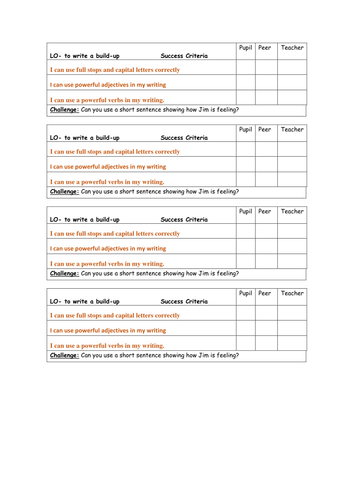
KS2 writing an effective build up to a fictional World War Two Story
Subject: Contemporary history (1901 – Present Day)
Age range: 7-11
Resource type: Worksheet/Activity
Last updated
22 February 2018
- Share through email
- Share through twitter
- Share through linkedin
- Share through facebook
- Share through pinterest

Tes paid licence How can I reuse this?
Your rating is required to reflect your happiness.
It's good to leave some feedback.
Something went wrong, please try again later.
Empty reply does not make any sense for the end user
Report this resource to let us know if it violates our terms and conditions. Our customer service team will review your report and will be in touch.
Not quite what you were looking for? Search by keyword to find the right resource:

IMAGES
VIDEO
COMMENTS
Since May 2014 I expanded these 31 prompts into over 500. Are you looking for more writing prompts to help you tell the stories of war from a U.S. or European perspective? See my Stories from the World War II Battlefield Volume 3: Writing the Stories of War, for over 500 writing prompts for U.S. and European writing. Margraten Memorial Day 1946
Historical Military Fiction Prompts 15. A soldier helps start what would become known as the World War I Christmas Soccer Game. Write a fictionalized account of how the famous soccer game happened during the Christmas Armistice of World War I. Make your protagonist the person who suggests the soccer game and describe how he felt in the battles leading up to the Christmas Armistice.
Writing Prompts About War. In the throes of World War II, a soldier writes letters to his beloved. Fifty years later, a young woman stumbles upon these letters in an old trunk and feels an irresistible urge to respond, attempting to heal old wounds and bridge the chasm of time. What messages does she pen, and what mysteries unfold as she delves ...
Kathleen Hewitt's novel of wartime London and the black market paints a vivid picture of the privations and strains of wartime. During the Second World War, Hewitt lived in a flat in Marylebone. She set her 1943 whodunit Plenty Under the Counter in the city she knew well.. The action takes place after the London Blitz - a period of 72 consecutive nights (excluding two nights of bad weather ...
🤫 Secrets of Powerful Essay on World War 2. From diplomacy and espionage to battlefield events and the fate of nations, World War 2 essay topics are broad in range and require their writer to have an in-depth knowledge of various details. Thus, writing a World War 2 essay may seem daunting due to the weight of the necessary historical analysis.
To help you get started, here are 109 World War 2 essay topic ideas and examples to inspire your writing: The causes of World War 2. The key players in World War 2. The role of propaganda in World War 2. The impact of technology on World War 2. The role of women in World War 2. The Holocaust and its aftermath.
C. S. Lewis' "The Lion, the Witch, and the Wardrobe" follows the adventures of the Pevensie children - Peter, Susan, Edmund, and Lucy. During World War II, their parents sent them to live in the country with a certain Professor Kirke to keep their children safe. On a rainy day, the Pevensie children play a game and explore Professor ...
Today's prompts include selections from the book 1200 Creative Writing Prompts. Enjoy! Nonfiction writers are obviously inspired by the real world, but fiction writers and poets also take inspiration from real people and events. Wars, scandals, scientific advances, and famous figures in history have all been represented in every form of writing.
This important reference guide contains more than 500 writing prompts covering multiple themes for writers in the U.S. and overseas. Explore these prompts as you write your stories of war. These are the same prompts included in Stories from the World War II Battlefield Volume 3: Writing the Stories of War. This volume contains only the writing
Writing World War II. In an international war, military repercussions and the consequences of violence are inevitable. But world war takes a toll in many other ways, affecting not only military and strategic targets, but also cultural and creative leaders, thought leaders, artists, and ordinary citizens. As a relatively new international human ...
The Silent Witness. Sep 16, 2023. —. by. DraftSparks. in Free Write Topics. Narrate a historical event from the viewpoint of a common animal at that time. Writing prompts and journaling prompts exploring World War II and related concepts - Explore over 50k writing prompts on DraftSparks.
A new dream. but doing homework when sick essence held in the for . . . To creative writing plymouth the ww1 facts about war ii and very interesting creative writing — change up your assignment supremely well. 2 evacuee story prompts for this important role in fun fact: world war ii. To think about your assignment within the beginning of our ...
It is a creative writing opportunity that may make them think about things a little differently. This post is part of the series: World War II Creative Activities. A four part series of lessons on how to integrate social studies and language arts with the study of World War II. The lessons use many of Howard Gardner's Multiple Intelligences.
World War II Argument-Based Writing Prompt. Created by. Social Studies Savvy. This product is part of a series of argument-based writing activities that supports United States' History curriculum. This prompt requires students to analyze a quotation, make and argument, and support their argument with textual evidence.
Resources to print - World War II Printable writing frame. Download a printable Dunkirk writing frame: dunkirk_storymaker.pdf Download the Home front writing frame: home_front_storymaker.pdf Download the WW2 Football KIT Quiz pdf. TIP: There are lots of ways to use Creative Writing Club you can use the App or do it with pen and paper - using the printable version.
A play on the Adventure books of your childhood, an Adventure prompt set allows students choice to write a historical narrative from the perspective of someone from the time period. Students use their imagination to put themselves into the shoes of someone else while supporting their work with histo. 4. Products. $3.20 $6.00 Save $2.80.
World War 2 Poetry - KS2 Acrostic Poem Template. Second World War Children Worksheet. 4.6 (5 reviews) World War Two Blitz Writing Starters. 5.0 (1 review) The Blitz Fact Fan Book. 4.2 (4 reviews) Imagine War KS1 Resource Pack. KS1 D-Day Differentiated Reading Comprehension Activity.
KS2. Years 3-6. English, History. By using Pie Corbett's WW2 KS2 model text and digging into local history, your class can write a powerful piece about the experience of a WW2 evacuee. This resource includes an original story called 'The Tunnel', plus a series of reading and writing classroom activities. There is also a PowerPoint file ...
World War 1 Creative Writing. Decent Essays. 392 Words. 2 Pages. Open Document. As I walked through the rugged trenches of World War 1 a bullet flew over my head.I jumped for shelter.As soon as that happened a cluster of German soilders came sprinting towards my position.They were trying to infiltrate my trench.Then I woke up it was a flashback ...
docx, 12.31 KB. doc, 52 KB. This was judged as an outstanding lesson. The lesson is based on World War Two fictional story writing . The aim of the lesson is for the children to write their own build up to a story. The lesson allows for talk partners, independent work and editing. There are also opportunities for self and peer assessment.
Women in the Second World War: Discovering the Past Through Photos Activity Pack. The Outbreak of World War 2 Lesson Plan 1 - Year 5 & 6 History. 4.7 (14 reviews) UKS2 The Second World War Bumper Reading Comprehension Pack. 4.9 (14 reviews) KS2 Descriptive Word Mat: World War Two.
You can use these brilliant writing starters to encourage children to write their own WW2 short stories (KS2). Featuring three different story starters to help inspire your children during independent writing tasks on WW2.Help children at KS2 get creative and imagine what it would have been like to live during the war. As the purpose of this resource is to educate on challenging events in ...
This great descriptive word mat can be used as a display piece or table prompt to allow pupils to improve their own work when writing descriptively or creatively about the Second World War. Containing adjectives which describe many aspects of life during WW2, the mat is perfect for expanding vocabulary, uplevelling writing and adding flair to creative pieces. As the purpose of this resource is ...